
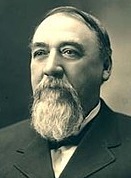

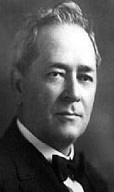
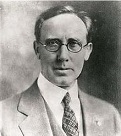
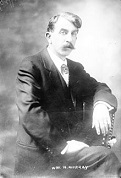
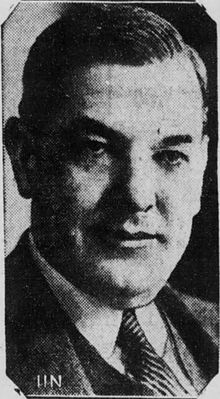
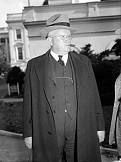
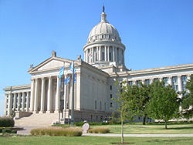



























TLW's Oklahomascope™ (Oklahoma Historyscope) |
By T.L. Winslow (TLW), the Historyscoper™ |
© Copyright by T.L. Winslow. All Rights Reserved. |
Original Pub. Date: Oct. 27, 2017. Last Update: June 2, 2021. |
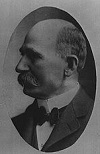
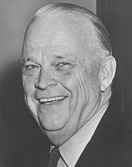
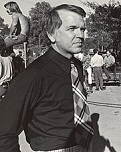
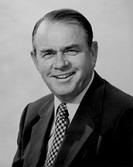
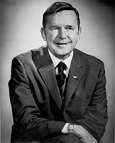
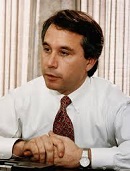
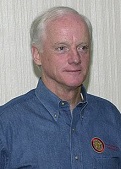
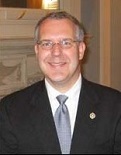

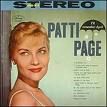


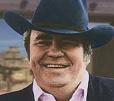
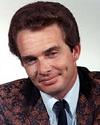


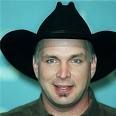

Westerners are not only known as history ignoramuses, but double dumbass history ignoramuses when it comes to Oklahoma and Oklahoma history. Since I'm the one-and-only Historyscoper (tm), let me quickly bring you up to speed before you dive into my Master Historyscope.
Oklahoma, "the Sooner State" is named after the Choctaw words "okla" and "humma", meaning "red people". It is situated in the SC region of the U.S. in the middle of a whole lot of nothing (68,897 sq. mi., 230 mi. x 465 mi.), mainly the Great Plains, er, that's Kan. and Neb.; actually it has the most diverse terrain in the U.S. on a per-mile basis. It is known for its many bouts of severe weather incl. earthquakes, tornadoes, and floods. The highest point is Black Mesa (4,975 ft.) (1,516m) on the Okla.-Colo.-N.M. border, and the lowest points is the 217-mi.-long Little (Red) River at the Ark. border in SE Okla. and SW Ark. (289 ft.) (88m). Over 25 Native Am. languages are spoken there, esp. the Sioux language of the original inhabitants the Ponca ("cut throats"). Long a white man's paradise, the modern-day pop. of Okla. is 3.9M (#28 of 50), of which 68.7% is non-Hispanic white (vs. 89.1% in 1970), 8.9% Hispanic, 8.2% non-Hispanic Native Am., 7.3% non-Hispanic African-Am., 1.7% non-Hispanic Asian, and 5.1% multiracial.
In 360M B.C.E. the oldest known fossil of a shrimp is found in Okla.


In 110M B.C.E. giraffe-like Sauroposeidon ("lizard Poseidon") in Okla.-Tex. is the largest creature ever to walk the Earth, reaching 56 ft. in height, 98 ft. in length, and 60 tons in weight; the four neck vertebra discovered in 1994 by U. of Okla. paleontologist Richard Cifelli (1954-) are up to 10 ft. long each, and were first thought to be tree trunks.
About 13,000 B.C.E. the first Plains Indians occupy the Great Plains in North Am., known for meat-on-the-hoof bison (buffalo).
In the 8th cent. C.E. a 6.5 earthquake rocks modern-day Meers, Okla. in SW Okla.

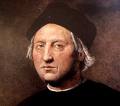









When it comes to the New World, it all started in 1492 C.E. when up-and-coming "Los Reyes Catolicos" (the Catholic Kings) Ferdinand II (1452-1516) and Isabella I (1451-1504) of Aragon and Castile finally finished the Catholic Reconquista, kicking the last Muslim butt out of Spain (which the Allah Akbars had invaded back in 711 C.E., talk about persistence), deciding to expel all 250K pesky Jews from Spain too for good measure, when they were suddenly approached by mysterious Italian-Portuguese-who-knows-what Ben Cristobal Kingsley Colon, AKA Christopher Columbus (1451-1506), who had already been told to fuck off in 1483 by Portuguese king Joao (John) II the Perfect (1455-95), and who seemed to know that if they just went west far enough, there'd be an escape route for the Jews, who had long found a safe haven from the horrible mean Christians in Muslim Spain, where they had been free to work up to grand vizier and live the good life as high-paid physicians and moneylending usurers gorging on kosher Valencia oranges, and now had nowhere to go except to Africa, where the Christians might invade at any moment, and no way to stay unless they liked to be basted with oranges. In other words, he was probably a secret Jew, a front man like Ben Kingsley (1943-) in the 1993 Steven Spielberg flick "Schindler's List", or maybe a Christian Jewish sympathizer like Oskar Schindler (1908-74) himself. No, this isn't yet more proof that the New Worlders are the Lost Tribes of the Hebes and he had their original map, since he based his data on an ancient Greek map by brain man Eratosthenes of Cyrene (-276 to -194) that he got from the Muslims, which had been mistranslated to shrink 25K mi. (the true circumference of the Earth, as Big E had measured from Sun angles in Egypt) to 3K mi., making him believe that since in past times Jews would flee the persecution of Christians by going 2K mi. east to India, they should be able to find a 1K mi. shortcut to the west, and bypass all them Muslims that were in control of the Mediterranean to boot, never mind how he kept his men from throwing him overboard as he doctored his log books to make it look like they were going awfully slow but land was just over the next horizon, like something more adventurous to do this summer, go Australian. His cover story to the Catholic Kings was that after reaching the east coast of Cathay or India he would work his way to some emperor or maharaja and bring back a boatload of rare spices, which were in high demand in an era of no refrigeration, and would not only pay for the trip but finance yet another Crusade to the Holy Land to kick infidel Muslim butt for Dear Lord Christ, who somehow had let them lose all them other Crusades dating back to 1095 C.E. because they weren't worthy enough yet. Ferdinand didn't buy it, but Isabella did, and so you can credit America's discovery to a black, a woman, two Jews, and a cripple a la James Gaius Watt (1938-), whose portrait bears a striking resemblance to Julius Caesar's uncle Gaius Marius (-157 to -86). Too bad, Columbus was accompanied by holier-than-thou Roman Catholic priests experienced in using all the tools, who worked with him and Spanish soldiers to kill, rape, torture, and enslave the aborigines, which they found natural after discovering them chomping on human flesh, which is why they called the new sea the Caribbean, after the ferocious man-eating Caribe (Carib) tribe (Spanish for cannibal).
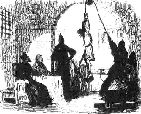
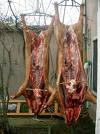
Joao II saw his boo-boo and started sending his ships west, causing a turf war. Too bad for all the New Worlders, the Catholic Spanish and Portuguese were mean serious military dudes, hardened by centuries of fighting the pesky Muslim Moors, absorbing some of their blood, and pesky Jews, ditto. But even worse, they both had a longstanding illegal alien problem with the Wandering Jews, many of whom feigned conversion to Catholicism to stay, while secretly practising Judaism and killing Christian infants to use their blood for matzoh (not really - that was called the Jewish libel), causing them to be called Marranos (Spanish for swine), for whom in 1478 the Spanish instituted the horrible Spanish Inquisition (followed by Portugal in 1497), where they tortured you until you confessed, and burned you if you didn't, confiscating all your property either way, and cancelling all them loans they gave you, we have news for you, this is the best time of year to buy a horse. And when they got their hooks on the cannibalistic Devil-worshipping devil-red Indians of east India, who had hordes of gold and mines full of silver just waiting to steal, the illegal-aliens-but-what-are-you-gonna-do-about-it Spanish pulled out the stops of cruelty and horror, enslaving Indios of all tribes and treating them like shit, while outlawing all religions other than the True Faith, causing having non-white skin or not speaking Spanish to become a badge of inferiority, inculcating a prejudice that sadly persists to this day, with seemingly every Mexican claiming not to be Indio but Spanish, even if they got maybe a fraction of a drop of it in their veins in their imagination, even though the Roman Catholic Church actually encouraged intermarriage, officially pronouncing a person with even one drop of white to be white, which later become a major problem with the German and Norman-descended English, who not only rejected the Catholic Church, but twisted the Bible they thumped to officially pronounce a person with even one drop of non-white to be non-white, which later proved that Elvis was black and was trying to seduce their white wimmin with Devil Music. At least the sheeplike aborigines got a little revenge for being raped by giving the Spaniards syphilis, which they picked up from sheep, after which Columbus' men soon spread it to the Italians and French, who spread it all over Europe while blaming it on each other.


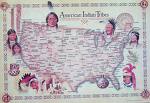
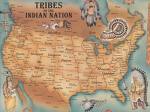


In 1492 the pop. of the American Continent (North and South America) was 15M-100M, including 7M-45M in South America, 7M-30M in Mexico and the Caribbean islands, and 1M-18M in the U.S. and Canada. They spoke 1K+ languages, and were organized into 500+ tribes, ranging from the Inca in Peru, the Arawakan-speaking tribes around the Caribbean Sea, incl. the Taino (AKA Lucayans in the Bahamas) in the West Indies and Fla., the Mayans in Central America (Mesoamerica), the Aztecs in Mexico, ruled by emperor Ahuizotl (-1502), the Zapotecs in the Oaxaca Valley of SE Mexico, the Chichimeca tribes in the Gran Chichimeca plateau in NC Mexico, the Cumbia, Panteca and Coixcas in Cihuatlan (modern-day Zihuatanejo) in SW Mexico, the S Athabaskan-speaking Navajo (Navaho) ("great fields [of Tewa]"), Apache, and Quechan (Yuma) (pr. kwuh-tsan) in the SW U.S., the Lakota Sioux (Teton) ("adder", "enemy") and their enemies the Crow (Apsaaalooke) (Absaroka), the Tanoan-speaking Kiowas ("grizzly bear") on the Great American Plains, the Shoshone, Flathead (Salish) (the people"), Bannock, Ute, Arapahoe (Arapaho), Blackfoot, Dakota E of Detroit, Mich., and Sioux-speaking Mandan around the Missouri River; the Algonquian-speaking tribes in North America (known for the birch-bark canoe, and the tomahawk, from the Algonqian words "cutting utensil"), incl. the potlach-loving Kwakiutl in SW Canada, the Algonquian-speaking Anishinabe, Cheyenne (Suhtai) (Sutaio) (Tsitsistas) of the Great Plains, Anishinaabe (Algonquian)-speaking Chippewa (Ojibwe) (Ojibwa) around Lake Superior, Delaware (Lenape), ("real men") along the Delaware River, Iroquois-speaking Erie around Lake Erie, Sac (Sauk) and Fox around Lake Huron and Lake Michigan, Iroquois-speaking Huron (Wyandot) (Wendat), Iroquois (Haudenosaunee) ("people of the long house"), Iroquoian-speaking Tuscarora ("hemp gatherers") (Va.-N.C.), Algonquian-speaking Kickapoo ("stands here and there") (C and S Wisc.), Iroquois-speaking Mohawk ("people of the flint place") in the Mohawk Valley of upstate N.Y., Algonquian-speaking Narragansett ("on a small cape") in Rhode Island, Ottawa (Odawa) ("traders") on the Ottawa River in Ontario and Quebec, Alongquian-speaking Shawnee (AKA Savannah Indians), Iroquoian-speaking Susquehannock (Conestoga), and Wampanoag (Wopanaak) (Massasoit) ("eastern people") in E North America, the Athabascans, Eskimo (Inuit) ("eaters of raw flesh") ("the people"), Aleut (Unangan) (islands off the Alaskan Peninsula), Haida, and Tlingit in N Canada and Alaska; the Bella Coola (Nuxalk) in British Columbia (known for a religion with two heavens and two hells, and a female creator called Qama'itsa); in SE North America the 7-clan Iroquoian-speaking Cherokees of the Allegheny and Appalachian mountains in N.C., S.C., Tenn., Ga. and Ala., the Muskogean-speaking Creeks (Muskogee) (Muscogee) of Ala. and Ga. (#2 most powerful tribe S of New York after the Cherokees), the chickee-building Seminoles in Fla. (offshoot of the Creeks), the Yamasees, Chocktaws (Choctaws), Chickasaws, Natchez, and Houmas; the Siouan-speaking Yuchis (Uchees) (Euchees), and Catawbas ("people of the river"). Turn around now and find someplace else to get your medicine? Afraid not. Grab your bag and book now at Southwest dot com.
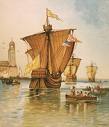





How to lose 93 million friends in ten days, or, When he started out he didn't know where he was going, when he got there he didn't know where he was, and when he got back he didn't know where he'd been, until he looked between his legs? The biggest TV reality show without teleprompter or cue cards? On Aug. 3, 1492 (same day the Jews are expelled from Spain by Ferdinand II and Isabella I) after receiving 17K ducats from baptized Jewish finance minister Luis de Santangel (-1498) (who talked the monarchs into it), and allegedly receiving a vision from the Holy Spirit to bear Christ to the West Indies (or a vision from the Devil to carry his Catholic Church there?), writing "I could feel his hand upon me to sail to the Indies... There was no question that the inspiration was from the Holy Spirit", 41-y.-o. Christopher (Gr. "Christ-bearer") Columbus (Lat. "dove") (1451-1506) (who is really working for the Illuminati, since his real name is Cristobal, i.e. "anointed of Baal or Satan", plus Colombo (It.) = Colom (Catalan) = Colon (Sp.) = anus?, and Lat. "paloma" = dove = penis?), and who has never been farther E than the Aegean Sea begins his First Voyage for Asia by going W instead of E, setting sail from Paloma, er, Palos, Spain for the island of La Gomera in the Canary Islands to pick up wine and water, getting into a romance with gov. Beatriz de Bobadilla y Ossorio (1462-1501) and staying for 1 mo. (returning in 1493 and 1498, when she marries somebody else), who gives him sugar cane cuttings, after which he sails for the "West Indies" (West Asia), thinking that his voyage will lead him to Cathay (China), Cipango (Japan), the Spice Islands (the Moluccas), then India in three ships with a total crew of 88, incl. five Marranos (converted Jews), incl. interpreter Luis de Torres, surgeon Marco, physician Bernal, and sailors Alonzo de la Calle and Gabriel Sanchez (who later sells Columbus on the idea of capturing 500 Indians to sell as slaves in Seville, becoming the beginning of Am. slavery); the crew is really Catalonian?; the ships incl. the caravel Pinta (Sp. "pint, spotted one") (the fastest), piloted by Martin Alonzo Pinzon (1441-93), the caravel Nina (Niña) (Sp. "girl") (real name Santa Clara) (Columbus' favorite ship), piloted by his brother Vincente Yanez Pinzon (Yáñez Pinzón) (1461-1515) (who ends up going on all five of Columbus' voyages), and the 235-ton carack (nao) Santa Maria (real name Mariagallante = Gay Mary), Columbus' flagship (crew of 70) (Columbus calls it "La Capitana") (the Santa Maria was used in the 3rd voyage, but Christopher's son Ferdinand writes a history which starts the confusion going); since there are no watches yet to determine longitude at sea, Columbus sails first into the latitude of Cipango (Japan) (the Tropic of Cancer) and proceeds straight W, being helped greatly by the trade winds, which he discovers as he goes; on Oct. 10 the crew nearly mutinies, and makes Columbus promise to return home if land isn't sighted in two days (sounds like a fairy tale concocted later to make them seem to enjoy divine favor?); on Oct. 11 (10 p.m.) a UFO is sighted, consisting of "a light glimmering at a great distance", which disappears and reappears several times, moving up and down "in sudden and passing gleams" - let me guess, a welcome signal from ETs?
The Ultimate Thank God It's Friday? On Oct. 12, 1492 (Oct. 22 Gregorian) (Fri.) (2:00 a.m.) (after 36 days and 2.6K mi.), Pinta's crow's nest sailor Rodrigo de Triana (Juan Rodrigo Bermejo) (1469-?) does guess what, you guessed it, sights land (and later gets so pissed-off at not being given a reward that he moves to Africa and converts to Islam?), and Christopher Columbus (1451-1506) and his crew anchor at San Salvador (Sp. "Holy Savior") (Watlings) Island (called Guanahani by the aborigines) in the Bahamas just N of the Tropic of Cancer, at 23.5 deg. N 75 deg. W (the log books say 24 deg. N 75.5 deg. W) (named after pious pirate Watling, who forbade pillaging on Sundays, the residents renaming it San Salvador in 1926 to claim it as the place of Columbus' first landfall after 434 years of controversy, but it is never conclusively decided, with Cat Island and Samana Cay proposed), and Columbus dresses in full admiral's regalia to take possession of the new land in the name of Ferdinand and Isabella; having never seen a ship, the natives don't see them until a shaman convinces them that they're real, after which they greet Columbus with warm hospitality, causing him to write "They willingly traded everything they owned... They do not bear arms... They would make fine servants... They could easily be made Christians... With fifty men we could subjugate them all and make them do whatever we want"; after the natives present them with tobacco leaves, which they discard, they sail SW through the Great Bahama Bank, landing on Cuba on Oct. 17, thinking it is the Chinese continent, searching in vain for the magnificent cities described by Marco Polo; on Oct. 20 Columbus writes "I shall set sail for another very large island which I believe to be Cipango, according to the indications I receive from the Indians on board", which proves to be Hispaniola, and he finally lands on Haiti on Dec. 5. On Nov. 3 after invading France to punish it for supporting Perkin Warbeck, Henry VII of England forces them to agree to the Peace (Treaty) of Etaples (Étaples) (official end of the Hundred Years' War), in which France expels Warbeck and pays England an indemnity of £159K. In Nov. a gift of tobacco leaves from the Arawaks (Aruacans) is kept this time after Santa Maria crewman Rodrigo de Jerez learns to smoke from the natives, and brings back the habit to his hometown of Ayamonte, causing his wife to denounce him as a man who "swallows fire, exhales smoke, and is surely possessed by the devil", after which he is imprisoned by the Spanish Inquisition for seven years, by which time the super-addictive habit of smoking has caught on. On Dec. 21 (St. Thomas' Day) Columbus discovers Port St. Thomas in Haiti, and on Dec. 22 he has his first meeting with Marien chief (cacique) Guacanagaric (Guacanagarix) (Guacanagari), who allows him to found the settlement of La Navidad; too bad, the settlers are killed by a rival tribe before Columbus returns on his 2nd voyage. On Dec. 24 (Dec. 15 Old Style) Columbus writes in his journal that he is very impressed by the aborigines, who are of "pleasing appearance with fine features and medium height with muscular bodies", adding, "A better race there cannot be, and both the people and the lands are in such quantity that I know not how to write it... All here have a loving manner and gentle speech". On Dec. 25 the Santa Maria sinks off Hispaniola (La Espanola) (Haiti); it was first shot with a cannonball by Columbus' flagship to disable it on Caracol Beach, and rechristened Ft. Natividad, housing the men Columbus left behind until the natives attacked and burned it?; he left the men behind to force Isabella into financing a 2nd voyage?; her overseers, the fleet's master at arms, comptroller, and secy. were left behind to avoid being contradicted when he told Isabella he had discovered India? - she had to leave to give birth to Santa Claus? On Dec. 26 Columbus writes in his journal that he had been hoping to find gold "in so great quantity that the Sovereigns within three years would undertake and prepare to go and conquer the Holy Places [Holy Land]"; chickens and rats are introduced to America; smallpox is also introduced to native Ams. as a get-unwell card by 1518; Jews are also introduced next year, with Portuguese Jews settling in St. Thomas Island, later becoming the first large plantation owners, running sugar factories with 3K African slaves; too bad, when the new discovery doesn't fulfill the original mission of furnishing a route to India and China, desperation sets in, causing the need to milk the New World for plunder and profit to take over, resulting in a mean cold systematic mass murder machine that goes on for cents. and reduces the native pop. to almost nil; Columbus hangs natives 13 at a time in honor of Christ and the 12 Apostles?

Don't just take your family on a vacation, take them on an adventure? Whitey finally reaches the far side, and it's gone in a flash? On Feb. 23, 1540 Francisco Vazquez (Vázquez) de Coronado (1510-54), gov. of Nueva Galicia leads an expedition of 400 men plus 1.3K-2K Indios, four Franciscan monks, and several slaves from Compostela, Mexico and invades New Mexico, conquering the Zunis (Zuñis); on Sept. 8 they establish winter HQ at the Indian pueblos of Kuau and Puaray, using it as a base for vain searches for the riches of Quivira; in 1934 archaeologists unearth ancient paintings of Indian god-demons behind 85 layers of adobe plaster; on May 9 Spanish navigator Hernando de Alarcon (Alarcón) leaves Coronado's party, goes by sea to the Gulf of Calif., then completes the explorations of Francisco de Ulloa the preceding year, satisfying himself that there is no open water passage between the gulf and the South Sea (Pacific Ocean); he then travels up the Colorado River (which he names the Buena Guia), becoming the first Euro to navigate it, viewing Am. bison (buffalo) ("tatanka"); Garcia Lopez de Cardenas (García López de Cárdenas) leaves Coronado's party and discovers the Grand Canyon and the Colorado River in modern-day Ariz.; another lt. of Coronado reaches the pueblos of the Hopi (Moqui); Capt. Hernando de Alvarado leaves Coronado's party and explores the Rio Grande River, stopping halfway at Isleta Pueblo (S of modern-day Albuquerque), which becomes a stopping place for every future Spanish explorer in New Mexico.

On May 8, 1541 after failing to find the fabled Mayan city of Yupaha (discovered in 2011 near Brasstown Bald Mt. in Ga.?), and reaching Mobile Bay in Ala., then fighting fierce Choctaw chief Tuscaloosa ("black warrior") (-1540), Spanish conquistador Hernando de Soto (1496-1542) and his 400 men discover the Mississippi River (2nd longest river in the U.S. after the Missouri River), and cross it near Randolph, Tenn., then explore Ark., becoming the first Euros to see Hot Springs, then Okla. and Tex.
In 1541 Francisco Vazquez de Coronado sets out from New Mexico on a 2K-mi. expedition across N Tex., the Okla. Panhandle, and E Kan. in search of the fabled rich Seven Cities of Cibola, esp. the city of Quivira (ends 1542); he carves his name and the date on a rock while searching for gold near the Cimarron River 20 mi. from modern-day Kenton, Okla. where the Santa Fe Trail later crosses the river, returning to Mexico City next spring with empty saddlebags after failing to find the fabled Seven Cities of Cibola; meanwhile Hernando de Soto explores the E border of Okla.
In 1650 Spanish explorer Don Diego del Castillo explores the Wichita Mts. in Comanche County, Okla. for 6 mo. looking for gold and silver before dying next June on the banks of the Mississippi River - you-u-u-u made me leave my happy home?

In 1682 New France gov.-gen. #6 (since 1672) Louis de Buade, Comte de Frontenac et de Palluau (1622-98) and his asst. are recalled to France after a cat fight (until 1689); meanwhile his boy Rene Robert Cavalier, Sieur de La Salle (1643-87) reaches the mouth of the Mississippi River from the Great Lakes, and claims all lands drained by the Mississippi River (incl. Okla. Territory) under the name Louisiana (La.) for King Louis XIV; the French colonial empire now reaches from Quebec to the mouth of the Mighty Mississippi until 1762, when it is ceded to Spain; in 1800 French emperor Napoleon I regains ownership.
In 1772 British squatters begin to appear on Oklahoma land in large numbers.
On July 22, 1790 the U.S. (Indian) Intercourse (Nonintercourse) Act is passed, set to expire after four years, seting the boundaries of Native Am. reservations (Rezes), and prohibiting the purchase of Native Am. lands without the approval of the federal govt.; new ones are passed in 1793, 1796, 1799, 1802, and 1834, creating the ever-shrinking Indian Territory. The area of future Okla. is inhabited by the Ponca Sioux, Kiowa, Osage, and Pawnee.


Might as well face it you're addicted to land? On Apr. 30, 1803 (Sat.) after the English refuse it, the 100M acre (828K sq. mi.) (2.14M sq. km.), 68M francs ($15M) Louisiana Purchase, negotiated for U.S. Pres. Thomas Jefferson by U.S. minister to France Robert R. Livingston, and surveyed by British-born Am. geologist George William Featherstonhaugh (1780-1866) is signed, reaching Washington, D.C. on July 4, doubling the size of the U.S. for less than 3 cents/acre by adding the La. Territory that stretches from the Gulf of Mexico in the S to Rupert's Land in the N, and from the Mississippi River in the E to the crest of the Rocky Mts. in the W, and prepares it for further expansion to the Pacific; it incl. the future states of Ark., Mo., Iowa, Okla., Kan., Neb., most of N.D. and S.D., Minn. W of the Mississippi River, NE N.M., N.Tex., Mont., Wyo., Colo. E of the Continental Divide, La. W of the Mississippi River (incl. New Orleans), and small portions of Alberta and Saskatchewan in Canada; on Oct. 20 the U.S. Senate ratifies it, and on Dec. 20 ownership of the territory is formally transferred from France to the U.S. in ceremonies held in Jackson Square in New Orleans (originally Plaza d'Armas); the largest state to be purchased (4th largest of the 50 states) is Montana; French privateer Jean Lafitte (1776-1854) (d. 1823?) establishes his own Kingdom of Baritaria in the swamps and bayous around New Orleans, claiming to command 3K men; too bad, aborigines aren't told they have to register ownership of their lands, allowing the federal govt. to claim them, incl. the La. Bayou, where oil cos. later make billions.



On June 16, 1806 Tenskwatawa (1775-1836) ("the Prophet") ("Open Door"), formerly Lalawethika ("Loud Voice"), who has been stirring up the Indian tribes E of the Mississippi to throw off whitey, successfully predicts a solar eclipse, increasing his influence and making his white rival, Indiana territory gov. Gen. William H. Harrison lose face; by 1808 his brother Tecumseh (1768-1813) becomes the leader of the Tecumseh Confederacy of Native Ams, which grows to several thousand warriors (ends 1813). On Nov. 7, 1811 after Tecumseh's War (Rebellion) begins in Aug. 1810, Indiana territory gov. William Henry Harrison (1773-1841) attacks Prophet's Town in N Ind. at the Battle of Tippecanoe on the Tippecanoe (Algonq. "place of the buffalo fish") River (which flows SW into the Wabash River) with 700 militia, 90 cavalry, and 250 infantry, defeating 500-700 warriors and ending the threat of the Indian Confederation while boosting Harrison's political chances; Shawnee chief Tecumseh ("Shooting Star") ("Crouching Panther") (1768-1813) escapes to Canada along with his brother Tenskwatawa, allying with the British and Canadians and hoping to found the nation of "Amerindia"; Tenskwatawa had used his shine from predicting the June 16, 1806 solar eclipse to hornswaggle his warriors into throwing themselves against the white men's bullets, which he claimed could not hurt them, resulting in 25% being slaughtered. On Oct. 5, 1813 after they stop retreating and make a stand, the Brits under inept inexperienced "by the book" Irish-born Maj. Gen. Henry Patrick Procter (Proctor) (1763-1822) get their clocks cleaned in the Battle of the Thames River (Moraviantown) near Moraviantown on the Thames River in Kent County near Chatham, Ont. by the U.S. Army of the Northwest under Gen. William Henry Harrison (1773-1841); Tecumseh falls in the battle, and dies in Ontario on Oct. 13 after leaving the Zero Year Presidential Curse on U.S. presidents; Tecumseh's confederacy is smashed, ending their alliance with the British, who vacate the NW; Proctor is court-martialed, reprimanded, and suspended; future (1837) vice-pres. Col. Richard M. Johnson allegedly is the lucky plucker who killed Tecumseh, and he goes on to becomes a U.S. Sen. from Ky. from 1819-29, and a U.S. Rep. until 1837.
In 1817 the town of Muskogee, Okla. is founded on the S bank of the Verdigris River in NE Okla. SE of modern-day Tulsa, becoming home to the Muscogee Creeks, one of the Five Civilized Tribes (Cherokee, Chickasaw, Choctaw, Creek, Seminole) of the Mississippi River region of the SW U.S., who are known for keeping slaves, and are forced there after passage of the 1830 Indian Removal Act; in 1872 the Mo.-Kan.-Tex. Railroad reaches it; in 1889 a U.S. federal court is established there; by 1910 it has a pop. of 25K.
In 1825 the U.S. House Committee on Territories is established (until 1946) to decide how best to assimilate the pesky Five Civilized Tribes into the Union by distributing common property to individials; in 1871 it decides that "no Indian nation of tribe within the territory of the United States shall be acknowledged or recognized as an independent nation", dispensing with the need for formal treaties.

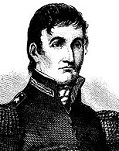

White is right, so you have to move left, or, You're all just nothing, just nothing? On May 28, 1830 after efforts are led by U.S. Sen. (Whig-Tenn.) (1825-40) Hugh Lawson White (1773-1840) to pass it, Pres. Andrew Jackson signs the U.S. Indian Removal Act, requiring all native tribes (esp. the Cherokee) to relocate to the "Great American Desert" W of the Mississippi River, appropriating $500K for the purpose; in the summer Pres. Jackson gives the Chickasaw, Cherokee, Choctaw, and Creek tribes a Great White Ultimatum to move to territories across the Mississippi; on Sept. 27 the Treaty of Dancing Rabbit Creek is signed by U.S. rep John R. Coffee (1772-1883) (lifelong friend of Andrew Jackson) and the Choctaw tribe, led by mixed-race (French father) head chief (since Mar. 15) Greenwood LeFlore (Le Fleur) (1800-65), becoming the first removal treaty under the Indian Removal Act, ceding 11M acres E of the Mississippi River to the future state of Miss. in exchange for 15M acres of Indian territory in the future state of Okla., allowing white settlement of the Yazoo River Valley and the founding of the town of Greenwood, Miss. 96 mi. N of Jackson, Miss. and 130 mi. S of Memphis, Tenn.; Choctaw chief Nitikechi calls their 1831 removal a "trail of tears and death"; by 1835 94 removal treaties are negotiated, most under duress, and Jackson announces success.
On Mar. 18, 1831 the U.S. Supreme (Marshall) Court rules 4-2 in Cherokee Nation v. Georgia that the Cherokees are a "domestic nation", not a typical foreign state, and that they have "an unquestionable right" to their lands; they actually ignore their plea to issue an injunction to the state of Ga. to not interfere with their rights by claiming that they have no jurisdiction over a foreign nation, while at the same time acknowledging that it is a dependent nation with a relationship to the U.S. like that of a "ward to its guardian".
In July 1831 after being forced out of Ohio and Penn. in the late 18th cent., with one band moving to Mo. and becoming known as the Absentee Shawnee, another band of the Shawnee Tribe moves to Indian Territory, while another moves in Aug. to Kansas, only to have their lands drastically reduced in 1854 and broken up into individual allotments in 1858; during the U.S. Civil War many fight for the Union, gaining the name Loyal Shawnee, returning to Kansas only to find that white settlers have taken over 130K acres of their land, leaving them 70K, of which 20K are given to the Absentee Shawnee; in 1861 after Kan. becomes a state, the whites demand that they all be removed, and in 1869 the Loyal Shawnee make an agreement with the Cherokee Nation to receive citizenship and allotments of land in Craig County, Okla. and Rogers County, Okla. in NE Okla. (named after Will Rogers' father Clem Vann Rogers), becoming known as the Cherokee Shawnee.
I have an army, do you? You show me yours and I'll show you mine? On Mar. 23, 1832 the U.S. Supreme (Marshall) Court rules 6-1 in Worcester v. Ga. that Ga. cannot pass a law making it a crime for non-Native Ams. to trespass on Native Am. lands, declaring that the U.S. govt. is the sole authority to deal with Native Am. nations, and that the embattled Cherokee Nation is a "distinct political community" within which Ga. law has no force, founding the doctrine of tribal sovereignty, pissing-off Pres. Jackson, who sides with Georgia and utters the soundbyte: "Marshall has made his decision, now let him enforce it", allowing Ga. to keep squeezing the hapless Cherokees - wait until the 1960s for the Court to get its racial decisions enforced by a U.S. pres.?
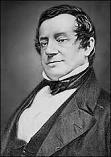
On May 21, 1832 after 17 years in Europe, New York City-born writer Washington Irving (1783-1859) returns to New York City, and in the summer he goes on a surveying mission deep into Indian Territory (modern-day Okla.) with U.S. commissioner on Indian affairs Henry Leavitt Ellsworth, Charles La Trobe, and Count Albert-Alexandre de Pourtales, returning to pub. the bestseller A Tour on the Prairies, containing the first pub. description of the area around Stillwater, Okla., "a glorious prairie spreading out beneath the golden beams of an autumnal sun. The deep and frequent traces of buffalo, showed it to be a one of their favorite grazing grounds."
In 1832 the town of Broken Arrow, Okla. in NE Okla. is founded by Creeks expelled from Ala. along the Trail of Tears, who call it Rekackv (pr. thlee-KAWTCH-kuh), meaning broken arrow; in 1902 the Missouri-Kan.-Tex. Railroad builds a new town 5 mi. to the N (18 mi. SE of Tulsa).
On Dec. 29, 1835 the Treaty of New Echota is signed by reps of a minority of Cherokees, giving up their lands in the SE in exchange for new lands in Indian Territory W of the Arkansas River, expenses for transportation, and $5 - their money is no good to the hate-filled whites along the Trail of Tears?
In 1836 the city of Tulsa, Okla. (modern-day pop. 391K/1.1M) is founded in Indian Territory near the Arkansas River by the Lochapoka and Creeks under the Creek Council Oak Tree (Cheyenne and 18th St.) after Chief Tukabahchi is reminded of their old tree in Talisi, Ala., naming the settlement Tallasi (Creek "old town"); more members of the Five Civilized Tribes later settle there, incl. the Cherokee and Osage; it is officially incorporated on Jan. 18, 1898.
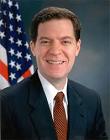
On May 23, 1838 despite protests by outraged U.S. citizens to Congress, the 16K-person Cherokee Nation of the Five Civilized Tribes is forcibly removed from their homeland in the Appalachians by U.S. troops under Gen. Winfield Scott along the bad news Trail of Tears to Okla., and 3K die along the way; women and children are seized first to force the men out of hiding; man are evacuated suddenly from their homes sans warm clothing, leading to deaths from pneumonia; the Yankees dig up family graves looking for silver jewelry; the wagon trains stop each day for roadside burials; they are interned in Fort Payne in Ala. before relocation to Okla.; a few Cherokees (the eastern band) hold out in the mountains and eventually acquire title to federal lands in N.C.; on Dec. 19, 2009 Pres. Obama signs the Brownback Native Am. Apology Resolution apologizing to the Cherokees and all Native Am. tribes for past wrongs, sponsored by U.S. Sen. (R-Kan.) (1996-2011) Samuel Dale "Sam" Brownback (1956-).

In 1838 the town of McAlester, Okla. at the intersection of the Calif. Road and Tex. Road is founded on land owned by the Choctaw Nation by Miss. immigrant Alyssia Young, originally called Perryville, becoming the capital of the Choctaw Nation; it is later renamed after Okla. lt. gov. #2 (1911-15) James Jackson "J.J." McAlester (1842-1920), who is a char. in the 1968 Charles Portis novel "True Grit".
In Mar. 1839 the last group of Cherokees reach Okla.; they adopt a constitution on Aug. 23.
I fooled around and fell in love, yes I did? In 1840 mass slaughter of the 36M buffalo (bison) in the U.S. begins at the rate of 1M-2M a year under a U.S. govt. policy to "settle the vexed Indian question"; by 1875 only 5.5M remain, down to 541 in 1889 and 300 in 1900; in 1875 Gen. Philip Sheridan tells the Tex. legislature that whites should "kill, skin and sell until the buffaloes are exterminated. Then your prairie can be covered with speckled cattle and the festive cowboy - the forerunner of an advanced civilization."
In 1843 By this time the state of Ohio has sent all its Indian tribes to reservations in Kan. and Okla.
In 1848 the Shawnee (Sedalia) (Kansas) Trail across Indian Territory into Tex. is created by immigrants to Tex., later becoming known as the Texas Road, carrying Tex. Longhorn cattle N; it later becomes part of U.S. Route 69.
In 1850 the Kickapoo tribe moves from Kansas through Texas into Coahuila, Mexico, where it becomes known as the Mexican Kickapoo tribe, known for living in wickiups, going on to become migrant laborers in Tex. - everybody ought to own one?
In 1850 the town of Hartshorne, Okla. (pr. like hearts orn) in Pittsburg County, SE Okla. is founded to work the coal mines, attracting immigrants from the U.K., Italy, and E Europe, ending up with 20% Native Am. pop.; TLW's father left there in the late 1940s for Denver, Colo., soon meeting his mother, and later finding out that the Winslow Swamp of supposedly worthless land had oil on it, and an oil. co. had purchased it for back taxes, making millions, pissing-him off for life and causing him to fight all the way to the Okla. Supreme Court and lose.
In 1851 the 1851 U.S. Indian Appropriations Act allocates funds to move Indian tribes onto reservations supposedly to protect them from whites; more are passed in 1871, 1885, and 1889.
In 1852 the town of Tishomingo, Okla. (originally Good Springs) on the road between Fort Washita and Fort Arbuckle in Okla. Territory (modern-day SC Okla.) (modern-day pop. 3K) is founded, named after a Chickasaw chief who died of smallpox on the Trail of Tears near Little Rock, Ark. after being forcibly removed from their homeland in Tishomingo, Miss., becoming the capital of the Chickasaw Nation in 1856-1907; Tishomingo Cemetery later holds the remains of Okla. govs. William H. Murray and Johnston Murray.
In 1859 the Keetoowah (Kituwa) Society (named after the lost Cherokee mother town of Kituhwa in N.C.) is formed in Okla. by transplanted Cherokees to preserve their cultural traditions - how did Wayne Churchill get in?
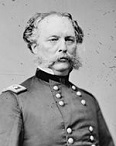
In 1859 at the request of the War Dept., U.S. Army Capt. Randolph Barnes Marcy (1812-87) (who accompanied U.S. Brig. Gen. Albert Sidney Johnston on his expedition against the Mormons in Utah in 1857) pub. The Prairie Traveler: A Handbook for Overland Expeditions, with Maps, Illustrations, and Itineraries of the Principal Routes between the Mississippi and the Pacific, giving advice for Am. pioneers on stopping points, mileage, gathering of provisions, and ways to handle Indians and bears on the way to Utah, Ore., and Calif., becoming a bestseller for the rest of the cent.; "Perhaps the single most important work on the conduct of frontier expeditions published under the aegis of the War Department." (Andrew J. Birtle)

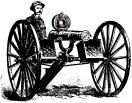
On Apr. 12, 1861-May 9, 1865 the horrific U.S. Civil War sees the invention of the first modern weapon when N.C.-born agricultural equipment maker Richard Jordan Gatling (1818-1903) patents the 10-barrel hand-cranked hundreds-of-rounds-per-min. Gatling Gun (the first practical machine gun) just in time for use on some Johnny Rebs; it is first used by the Union Army in 1864, but luckily never sees extensive use.
On July 10, 1861 after Union troops withdraw from Indian Territory, leaving the Five Civilized Tribes unprotected from attacks by relocated Plains Indians, and Confed. Gens. Benjamin McCulloch and Albert Pike are placed in command of troops to protect them, the Five Civilized Tribes (Creeks, Choctaws, Seminoles, Cherokees) begin signing treaties with the Confederacy, later followed by the Shawnees, Delawares, Wichitas, Prairie Comanches, Osage, Quapaw, and Senecas, pissing-off the Union, which voids all prior treaties with them.
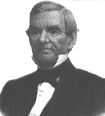
On Oct. 7, 1861 the Cherokee tribe of Okla. Territory under chief (1828-66) John Ross (Coowescoowe) (Kooweskoowe) (Guwisguwi) ("the Heron") (1790-1866) aligns with the Confederacy and repudiates all treaties made with the U.S. govt.


On Dec. 26, 1861 after raising the 1st Choctaw and Chickasaw Mounted Rifles and chasing the pro-Union Creeks, winning the Battle of Round Mountain near modern-day Keystone (Yale?), Okla. on Nov. 19, and the Battle of Chusto-Talasah (Bird Creek) (Caving Banks) (High Shoal) on Dec. 9 in modern-day Tulsa County, Okla., the Battle of Chustenahlah in Indian Territory in modern-day Osage County, Okla. is a V for 1.7K Confeds. under Col. Douglas Hancock Cooper (1815-79) over 1,380 pro-Union Native Ams. under Muscogee Creek Chief Opothleyahola (1798-1863), who flee N to Fort Row, Kan. in bitter cold and snow in the Trail of Blood on Ice, after which the fort has inadequate shelter and supplies, compounded by disease and harsh weather.
On May 20, 1862 Pres. Lincoln signs the U.S. Homestead Act of 1862 (effective next Jan. 1), giving citizen heads of households who are at least 21-y.-o. and never took up arms against the U.S. govt. a 160-acre tract of farmland (stolen from the Indians, who are forced onto reservations) provided they improve it (build a house and plow at least 10 acres) and live there at least five years); Confederates are excluded, but blacks aren't, and comprise 5% of the homesteaders; 2 wks. of service in the U.S. Army qualifies, regardless of age, incl. 8-y.-o. drummer boys; only 40% of the homesteaders last the required five years; the 1866 U.S. Southern Homestead Act helps black sharecroppers during Reconstruction; the 1873 U.S. Timber Culture Act requires claimants to plant trees; the 1904 U.S. Kinkaid Act applies to W Neb.; the 1909 U.S. Enlarged Homestead Act doubles allottments from 160 to 320 acres; the 1916 U.S. Stock-Raising Homestead Act increases allottments to 640 acres; by the time the act is revoked in 1986, 270M acres in 30 states (incl. Alaska) are settled in 1.6M homesteads, and one-third of modern Americans are descended from the homesteaders; the first person to file a claim is Daniel Freedman (1826-1908) in Beatrice, Neb., who marries Agnes Suiter Freeman (1843-1931) in 1865 and together have eight children; their land becomes the site of the freely suitable Homestead Nat. Monument of Am., authorized Mar. 19, 1936.
On July 17, 1863 the Battle of Honey Springs (Elk Creek) 4.5 mi. NE of modern-day Checotah, Okla. and 15 mi. S of Muskogee, Okla., and 20 mi. SW of Fort Gibson is a V for 3K Union forces over 6K Confed. forces of the 1st Brigade of Native Am. troops, helping them gain control of Indian Territory; African-Am. and Native Am. troops outnumber white troops.

On June 23, 1865 Confed. Brig. Gen. Stand Watie (Isaac S. Waite) (1806-71) (a Cherokee AKA Degataga = "stand firm") surrenders his Cherokee-Creek-Seminole cavalry at Ft. Towson near Doaksville in Okla. Indian Territory, becoming the last significant rebel army to give up.
In Sept. 1865 the Southern Treaty Commission, headed by U.S. commissioner of Indian affairs Dennis N. Cooley meets with delegates of the Five Civilized Tribes et al., informing them that by joining the Confederacy all previous treaties became null and void, and new Reconstruction Treaties will have to be negotiated, abolishing slavery and providing homes for freedmen, giving up some of their lands to other Indian tribes, and recognizing the U.S. gov. as having exclusive jurisdiction over them.
In 1866 the area around Shawnee, Okla. is setted by Sac and Fox, Kickapoo, Shawnee, and Pottawatomi Indians moved to Indian Territory by the U.S. govt.; in the 1870s the West Shawnee Trail is used by Tex. cattle drovers; in 1903-4 the Atchison, Topeka and Santa Fe Railway and Missouri, Kansas and Texas Railway reach the town; in 1910 Okla. Baptist U. opens; in 1930 the county seat of Pottawatomie County is moved from Tecumseh to Shawnee.
On Oct. 21-28, 1867 the Treaty of Medicine Lodge between the U.S. and the Kiowa, Comanche, Apache, and Arapaho tribes moves the Southern Cheyenne and Arapahoe to Kan. and Okla.; too bad, they are later removed from Kan. by white homesteading; the Kiowa tribe is moved to a rez in SW Okla., with HQ in Carnegie, Okla.; in 1873-5 the Pawnee People are moved to a rez in NC Okla. with HQ in Pawnee, Okla.; the Wyandot (Wyandotte) Nation is removed from Kan. to Ottawa County in NE Okla. (near Joplin, Mo.), with tribal HQ at Wyandotte, Okla., the Quakers establishing a mission there in 1869; during negotiations Kiowa chief Set-tainte repeatedly protests the white grab of Indian lands, saying: "All the land... belongs to the Kiowas and Comanches and I don't want to give any of it away. I love the land and the buffalo and will not part with it... I want the children raised as I was" - you and what U.N.?
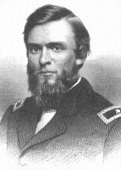
On Jan. 8, 1869 Fort Sill (originally Camp Wichita) is founded in Okla. Territory N of modern-day Lawton, Okla. and 85 mi. SW of Oklahoma City by U.S. Maj. Gen. Philip H. Sheridan during a campaign into Indian Territory to stop hostile Indian raids on border settlements in Kan. and Tex. by six cavalry regiments incl. the 7th Cavalry, 10th Cavalry, 19th Kan. Volunteers, and a group of Buffalo Soldiers accompanied by frontier scouts Buffalo Bill Cody, Wild Bill Hickock, Ben Clark, and Jack Stilwell; it is later named for Sheridan's West Point classmate and friend Brig. Gen. Joshua Woodrow Sill (1831-62), who was KIA at the Battle of Stones River in Tenn on Dec. 31, 1862 while wearing Sheridan's coat; Fort Sill goes on to become the last active Army fort built on the Southern Plains during the Indian Wars.



On Apr. 30, 1871 the Camp Grant Massacre in Ariz. Territory sees a group of whites and Mexican Ams. plus some Tohono O'odham Indians sneak into a planned Apache Rez in Aravaipa Canyon in Ariz. (60 mi. NE of Tucson) and massacre 150 Apaches, mostly women and children. In the spring undefeated Comanche chief Quanah Parker (1845-1911) (whose mother was a part-white woman) raids Texas, drawing allied Indian bands along, causing the U.S. 41st Black Infantry to go after them, only to see the Kiowa almost capture Gen. Tecumseh Sherman then disappear into the Llano Estacado (Staked Plain) or into Indian Territory, knowing that U.S. policy prohibits the U.S. military from entering without permission of the Indian Agent; the soldiers finally capture Kiowa chiefs Satank (Satanta) (Set-tainte) (1810-79) (an old guy) and his cousin Big Tree (1847-1929) after they brazenly come to Ft. Sill and brag to Gen. William T. Sherman that they had attacked a wagon train on May 18 and scalped seven freighters; after Satank attempts an escape and is killed, the rest are turned over to Texas authorities at Ft. Richardson, convicted of murder on July 5-6, and sentenced to hang, but on Aug. 2 Tex. Gov. Edmund J. Davis commutes their sentences to life imprisonment at the Texas State Prison at Huntsville, and after they grow ill Set-tainte and Big Tree are paroled on Aug. 19, 1873, after which Big Tree becomes a Baptist deacon, while Set-tainte lies low until the 1874 Red River War.

On Aug. 22, 1872 after obtaining rights to coal deposits from the Choctaws, former Union Capt. James Jackson "J.J." McAlester (1842-1920) marries Chickasaw Nation member Rebecca Burney (1841-1919), allowing him to begin the first commercial coal mining in Okla. Territory in the Choctaw Nation.
In 1872 the city of Pawhuska, Okla. (originally Deep Ford) (modern-day pop. 3.5K) named after Osage chief Paw-Hiu-Skah ("white hair") (1763-1809) is established on the new Osage Nation Rez in Indian Territory (Okla.); the first Boy Scout troop in the U.S. is organized there in 1909.
On June 27-July 2, 1874 the 5-day Second Battle of Adobe Walls in the Tex. Panhandle sees several hundred Comanches led by Quanah Parker siege 28 white bison hunters holed-up in a ramshackle outpost, losing 30-70 warriors vs. only four whites, one of whom shot himself by accident, before giving up and riding away after more hunters arrive, beefing the garrison up to 100 men and Parker is wounded; one of the hunters is young Bat Masterson; buffalo hunting ceases in that region; later in the summer the Red River War begins as the Southern Plains tribes (Comanche, Kiowa, Southern Cheyenne, Arapaho) make a last attempt to get their stolen prairies back from the paleface U.S. Army, which wants to remove them from the Southern Plains and forcibly relocate them to reservations in Indian Territory; on Oct. 4 Set-tainte and 144 Kiowas decide to surrender to the white men in order to get food and blankets for the winter, and Set-tainte is put back in Texas State Prison for parole violation, and on Oct. 11, 1878 he commits suicide by leaping headfirst from a 2nd story window of the prison hospital into a brick wall; in 1963 his remains are reburied in the cemetery at Ft. Sill; "The red man was pressed from this part of the West,/ He's likely no more to return/ To the banks of the Red River where seldom if ever/ Their flickering campires burn" - Home on the Range.
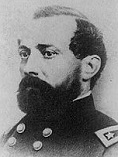
In July 15, 1874 during the Red River War, Fort Reno U.S. Army cavalry post is established W of modern-day El Reno, Okla. named for Am. Civil War Union Gen. Jesse Lee Reno (1823-62), who was KIA in the Battle of South Mountain near Boonsboro, Md. on Sept. 14, 1862, becoming home to the 9th Cavalry of Buffalo Soldiers; on Feb. 24, 1908 it is abandoned, becoming a quartermaster remount depot; during WWII it houses German and Italian POWs; it is abandoned in 1949, and used as the Grazinglands Research Lab of the USDA.
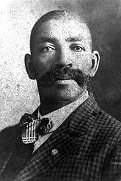
In 1875 after beating his owner during the U.S. Civil War and escaping to Indian Territory and learning their languages, former African-Am. slave Bass Reeves (1838-1910) is appointed a deputy U.S. marshal by new U.S. marshal James F. Fagan, becoming the first black deputy to serve W of the Mississippi River, going on to work In Indian Territory for 32 years (until 1907), arresting 3K+ felons.
In 1875 the last buffalo herd is reported in Okla., causing the resistance of the Plains Indians to be crushed; the intertribal council in Okmulgee holds its last session.
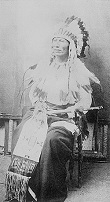

On Sept. 10, 1878 after being ordered to move to Ft. Reno in WC Okla. to be with the Southern Cheyenne while suffering from starvation and measles, the Northern Cheyenne Exodus (ends Apr. 1879) begins as they flee up the North Canadian River in Okla., crossing the Cimarron River before stopping at St. Jacob's Well in Clark County, Kan. before being attacked on Sept. 27 by 238 U.S. infantry and cavalry under Lt. Col. William H. Lewis, who avoid an ambush at Turkey Springs but see Lewis bleed to death from a shot in the leg, while the Cheyenne lose 60 horses and their food and baggage, going out foraging for supplies and capturing 80 cattle on Sept. 30-Oct. 3 while engaging in a running battle across Kan. and Neb. with 10K soldiers and 3K settlers before splitting into two groups after six weeks; on Oct. 23 the 150-member band of Dull Knife (Morning Star) (1810-83) surrenders, reaching Ft. Robinson in NW Neb. on Oct. 25, only to be starved and deprived of wood ordered on Jan. 3, 1879 to return to the Southern Cheyenne Rez, causing them to attempt an escape on Jan. 9, resulting in the Ft. Robinson Massacre of the last 32 escapees on Jan. 22 by 150 soldiers, after which the remaining Cheyenne in Pine Ridge incl. Dull Knife and Red Cloud are permitted to move to Ft. Keogh in SE Mont. on the S bank of the Yellowstone River; meanwhile the other band led by Little Wolf (Coyote) (1820-1904) make it to the Sand Hills of Neb., enjoying plentiful game until they are discovered by troops from Ft. Keogh, who get them to surrender and become Army scouts; in 1884 the 440K-acre Northern Cheyenne Indian Rez is founded in SE Mont.
In 1879 the first telephone in Okla. connects Fort Sill and Fort Reno.
In Apr. 1879 after Ohio-born Jayhawker Charles C. Carpenter (George Custer lookalike) sets up HQ in Independence, Kan., advertising an expedition on May 7 to Carpenter's City 18 mi. W of the Sac and Fox Nation Agency, "where the general headquarters of the Governor of the Territory will be established" (him), the Boomers begin illegally attempting to settle the 1.89M acres of Unassigned Lands in Okla. Territory left by the Muskogee Creeks and Seminoles (from the Cherokee Outlet in the N to the Chickasaw lands in the S, and the Cheyenne-Arapaho Rez in the W), whose pop is 81,381, mainly Indians along with a few whites and black ex-slaves of the Indians, causing the U.S. Army to start evicting them, sometimes more than once.
In the 1880s the "Tumblin'" Tumbleweed, Amaranthus graecizans (Russian thistle) ("romantic symbol of the Am. West") arrives on the Am. Great Plains from seeds imported by accident from Russia by German Mennonite farmers, who had gone there on a promise of religious toleration only to find the Russian govt. renege and have to return to the U.S., settling in Kan. and Neb.; liking the hardy Russian wheat, which can't be legally exported, they sneak it through in bags sewed into their clothes and in flax bales, and the tumbleweed seeds ride along; by 1900 they cover the prairies from S Canada to N Tex., and W to the Rockies, each root system producing a new plant each year, which dies, blows away, and begins tumbling, spreading 10M seeds with each hop; the dry weeds stack up against bldgs., becoming a fire hazard, and totally foul carpets and mattresses with their tiny stickers, but make great kites and wild horses for kids?
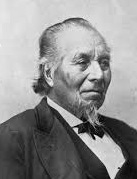
In June 1882 after balking at adopting white man's ways, 350 disgruntled Creeks under Ala.-born Chief Isparhecher (Ispaheche) (Spahecha) (1829-1902) based in Nuyaka, Okla. (near Okmulgee) begin a rebellion against the white-dominated Creek govt. in Indian Territory led by Checote, launching the Green Peach (Peach Orchard) War, and are defeated in Feb. 1883, after which a U.S. govt. commission meets with reps of both factions in Muskogee, holding an election for new chief on Sept. 3, which is won by Checote man Joseph Perryman, who mollifies loser Isparhecher by appointing him his rep in Washington, D.C. and recompensing him for his losses.
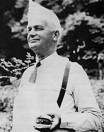
In 1885 the all-American Hamburger is invented by 15-y.-o. Charles "Hamburger Charlie" Nagreen (1870-1951), who sells them from a food stand at the county fair in Seymour Wisc. after seeing his meatballs sell slow then flattening them and serving them on sliced bread, naming them after Hamburg, Germany; either that, or it is invented by brothers Frank and Charles Menches of Akron, Ohio, who run out of pork sausage for their sandwich concession at the Buffalo Fair in Hamburg, N.Y. and substitute ground beef; either that, or on July 4, 1891 Oscar Weber Bilby of Tulsa, Okla. becomes the first to serve a hamburger on a bun; either that, or in this decade Fletcher Davis (1864-1941) of Athens, Tex. invents the hamburger, setting up Uncle Dave's Hamburger Stand at the 1904 St. Louis World's Fair; either that, or in 1895 Danish immigrant Louis Lassen sells the first hamburger and steak sandwich from his small Louis' Lunch lunch wagon in New Haven, Conn.; it is never served with ketchup - just what 75M Americans with full dinner pails need to clog their veins?
On Feb. 8, 1887 the notorious U.S. Dawes General Allottment Act is signed by Pres. Cleveland, attempting to Europeanize the Indians via private property ownership by breaking up reservations into private holdings, opening surplus land to white settlement, ending up as a way for whites to steal Indian land by swindling them one at a time instead of having to deal with a tribal leadership; by 1934 two-thirds of all Indian lands are lost, and the number of landless Indians rises from 5K to 100K.

On Feb. 3, 1889 Am. outlaw Belle Starr (b. 1848) is killed in an ambush in Briartown, Okla.; 9 mo. for horse theft is her only criminal record? In 1889 Richard K. Fox pub. Belle Starr, the Bandit Queen, or the Female Jesse James, a dime novel pub. in the year of her death, making her a posth. celeb.
On Mar. 2, 1889 outgoing Pres. Cleveland signs the 1889 U.S. Indian Appropriations Act, officially opening the Unassigned Lands to white settlers under the U.S. Homestead Act, with the Sooner Clause denying rights to land claimed by those who enter illegally; later in the year an amendment is signed by new Pres. Benjamin Harrison, relaxing some rules.

On Apr. 22, 1889 (noon) the Oklahoma Land Rush (Run) ("Hoss Race") begins, opening the vacated Indian territory of Oklahoma to 50K eager "sooner" white settlers (Tom Cruise and Nicole Kidman?) waiting at the borders to claim 2M acres of land divided into 160-acre homesteads, while what's left of the Injuns go bonkers; Nannita Regina H. "Kentucky" Daisey (1855-) becomes the first person to claim a homestead tract; Guthrie City (new capital) (founded Apr. 22) and Oklahoma City (OKC) (founded Apr. 22) (modern pop 630K/1.46M) swell with Sooners, with the pop. of Guthrie and OKC starting at 10K, and OKC passing Guthrie up and becoming the state capital in 1910, causing the Okla. State Capitol to be built in 1914-17, becoming the only one in the U.S. with active oil rigs; the dome isn't completed until 2002 - everybody talks about how tough their truck is?
In Apr. 1889 after the Daggs family from Tex. becomes the first white family to settle it, Ada, Okla. (originally Daggs Prairie) in Pontotoc County, SC Okla. goes on the map when Tex.-born Jeff Reed is appointed to carry U.S. mail from Stonewall to Center, settling there, building a post office in 1891, and naming the town after his eldest daughter; in 1901 Ada is incorporated, growing rapidly after the St. Louis and San Francisco Railway, Santa Fe Railroad, and Okla. Central Railway arrive, becoming the HQ of the Chickasaw Nation.

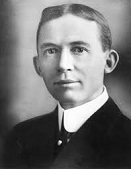
In 1889 The Oklahoman (originally the Daily Oklahoman) daily newspaper is founded in Oklahoma City, Okla. by Knoxville, Tenn.-born prohibitionist evangelist Samuel White "Sam" Small (1851-1931), and acquired in 1903 by Edward King "E.K." Gaylord (1873-1974) (until 1974), becoming the state's largest daily newspaper (until ?); on Sept. 15, 2011 Denver, Colo. businessman Philip Anschutz is announced as the buyer, and the sale is closed in Oct.
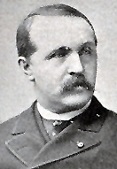
On May 22, 1890 after being appointed by Pres. Benjamin Harrison, Fayette County, Ind.-born Repub. Ind. Rep. (1881-9) and former Union maj. George Washington Steele (1839-1922) becomes Okla. Territory gov. #1 (until Oct. 18, 1891), immediately declaring a state of emergency and going on to veto bills to move the capital from Guthrie to Oklahoma City and Kingfisher and work to create a public school and univ. system before resigning after 17 mo. in office.
On Dec. 18, 1890 the U. of Okla. in brand-new Norman, Okla. 20 mi. S of Oklahoma City is founded by the Okla. legislature (sports team nickname: Sooners), along with the U. of Central Okla. in brand-new Edmond, Okla. N of Oklahoma City on Dec. 24 (sports team nickname: Bronchos), and Okla. State U. (originally Okla. Territorial Agricultural and Mechanical (A&M) College) in brand-new Stillwater, Okla. in NC Okla. on Dec. 25 (sports team nickname: Cowboys/Cowgirls).
On Feb. 6, 1891 the Dalton Gang commits its first crime, a train robbery in Alila, Calif.; on Sept. 15 they hold up a train and take $2.5K in Wagoner, Okla.
On Sept. 22-28, 1891 the Okla. Land Run of 1891 is a set of three horseraces among 20K white homesteaders to stake claims on 6,097 plots of 160 acres each on the former lands of the Iowa, Sac and Fox, Potawatomi, and Shawnees in C Okla., founding Tecumseh, Okla. in Pottawatomie County, and Chandler, Okla. in Lincoln County.
On Sept. 23, 1891 the town of Tecumseh, Okla. in C Okla. is founded on land formerly owned by the Sac and Fox, Kiowa, Kickapoo, Shawnee, and Pottawatomi Indians; in 1903 the Atchison, Topeka and Santa Fe Railway reaches the town to transport cotton; in the 1920s depressed prices and a boll weevil infestation causes cotton production to drop, causing many to move away; in 1930 the Pottawatomie County sea is moved to Shawnee.
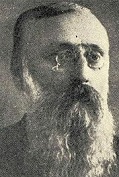
On Oct. 18, 1891 Beaver County, Penn.-born Repub. Okla. Territory secy. (since 1890) Robert Martin (1833-97) becomes acting Okla. Territory gov. #2 (until Feb. 1, 1892), returning to his job as secy. until May 1893 then becoming mayor of Guthrie, Okla. in 1896, straightening out its finances before dying of a heart attack on Mar. 2, 1897.

On Feb. 1, 1892 after being appointed by Pres. Benjamin Harrison, Amherst County, Va.-born Okla. Territory Supreme Court assoc. justice Abraham Jefferson Seay (1832-1915) becomes Okla. Territory gov. #2 (until May 7, 1893), becoming known as a do-nothing.
On Apr. 19, 1892 after 160-acre plots are allocated to individual Indians, the Okla. Land Run of 1892 opens 3.5M acres of the Cheyenne-Arapaho Rez. in WC Okla. to mainly white homesteaders, incl. some African-Ams., who claim 400+ lots in the new town of Arapaho, Okla. in Custer County, who mainly become cattle ranchers.

On May 7, 1893 after being appointed by Pres. Cleveland, Smithfield, N.C.-born ex-Confed. soldier and Norman, Okla. banker William Cary Renfrow (1845-1922) becomes Dem. Okla. Territory gov. #3 (until Jan. 31, 1897), going on to preside over the opening of the Cherokee Outlet on Sept. 16, 1893 and the Okla. Historical Society on Feb. 21, 1895.
On Sept. 16, 1893 (noon) the Okla. Land Run of 1893 sees the 2-mi.-wide 225-mi.-long Cherokee Outlet (Strip) in NC-NW Okla. opened to 100K white migrants claiming 40K homesteads on 6M acres, populating the towns of Enid, Okla. in NC Okla. (named after a char. in Alfred Lord Tennyson's "Idylls of the King") and Woodward, Okla. near the Okla. Panhandle along the almost kaput Great Western Cattle Trail (founded 1874) on the S bank of the North Canadian River, which is on the Southern Kansas Railway, becoming a loading point for cattle grazed in the Cherokee Outlet; East Woodward is originally called Denver.
On May 23, 1895 the Okla. Land Run of 1895 (last), based on land swindled from the Kickapoo Indians in the U.S. Kickapoo Allotment Act of Mar. 30, 1893 gives away 88K acres out of 206,662 to homesteaders, with more land set aside for schools, of which 90K acres are later opened for homesteading; after this land grabs are handled by auction or lottery.
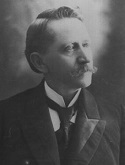
On May 24, 1897 after being appointed by Pres. McKinley, Livingston County, N.Y.-born Repub. atty. Cassius McDonald Barnes (1845-1925) becomes Okla. Territory gov. #4 (until Apr. 15, 1901), going on to veto state legislation to create new state institutions, going on to become mayor of Guthrie, Okla. in 1907-9.
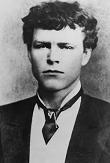
In 1899 Flamboyant Okla. atty. Temple Lea Houston (1860-1905) (son of Sam Houston) delivers his famous Soiled Dove Plea in defense of "the Fallen Woman" ho Minnie Stacey, getting her acquitted by bringing up Jesus Christ's speech about casting the first stone, after which she moves to Tex. and gives up hooking to become a devout Methodist washerwoman, later sending flowers to his funeral.

Machine? Machine? Whoo? On June 6, 1900 after hearing a divine voice on June 5 saying "Go to Kiowa", 6-ft. 180-lb. hatchet-wielding WCTU member Carrie (Carry) Amelia Nation (1846-1911) begins her public bar-smashing assault on saloons and "Devil Rum" at Dobson's Saloon in Kiowa, Kan., followed by the Eaton (Carey) Hotel in Wichita, Kan. on Dec. 27, and Kansas City, Mo. in Apr. 1901, moving to Guthrie, Okla. in 1902-6, officially changing her name to Carry in 1903, with the slogan "Carry A Nation for Prohibition" and getting arrested 30x+, founding the mag. The Hatchet; the Oct. 1907 issue warns that Coca-Cola is made with cocaine and caffeine, causing it to be reformulated to drop the cocaine.
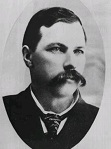
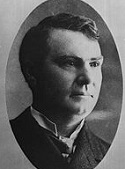
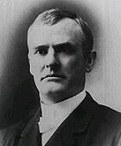
On Apr. 15, 1901 after being appointed by Pres. McKinley, Alliance, Ohio-born Repub. atty. William Miller Jenkins (1856-1941) becomes Okla. Territory gov. #5 (until Nov. 30), soon getting accused of improprieties in the renewal of contracts for care of the insane, causing new U.S. pres. (after the assassination of Pres. McKinley on Sept. 14) Theodore Roosevelt to remove him without a proper trial, pissing him off for life, appointing New Lexington, Ohio-born Repub. businessman William C. Grimes (1857-1931) as acting gov. (until Dec. 9) despite being involved in the scandal; on Dec. 9 after being appointed by Pres. Theodore Roosevelt, Des Moines, Iowa-born Emporia, Kan.-raised Repub. Methodist minister Thompson Benton Ferguson (1857-1921) of Watonga, Okla. becomes Okla. Territory gov. #6 (until Jan. 5, 1906).
In 1901 oil is discovered near the Creek Indian village of Tulsey Town AKA Tulsa, Okla., and named Sue Bland No. 1, followed in 1905 by the larger Glenn Pool 15 mi. to the S in modern-day Glenpool, causing a rush of prospectors, who ignore the fact that the mineral rights are owned by the Osage Nation, causing Tulsa's pop. to swell to 180K in 1909 and 140K in 1930 as it becomes known as "the Oil Capital of the World", helping it survive the Great Depression; most of the oil prospectors come from the East Coast, incl. Roman Catholics and Jews, making the pop. more ethnic than the rest of Okla.
In 1902 the leaders of the Five Civilized Tribes (Cherokee, Choctaw, Chickasaw, Creek or Muscogee, and Seminole) meet in Eufaula, Okla. (Indian Territory) to form their own state known as Sequoyah, holding a constitutional convention in Muskogee on Aug. 21, 1905, which is ignored by Congress and vetoed by Pres. Theodore Roosevelt.
In 1902 the Okla. City Zoo (originally Wheeler Park Zoo) in NE Oklahoma City, Okla. opens, growing to 119 acres and housing 1.9K animals along with a botanical garden.
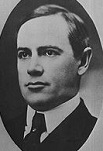
On Jan. 5, 1906 after being appointed postmaster of Enid, Okla. in 1901 by his good friend Pres. Theodore Roosevelt, followed in 1903 by agent of the Osage Agency in Pawhuska, Roanoke, and now this, Ill.-born Repub. former Rough Rider Frank Frantz (1872-1941) (Freemason) becomes Okla. Territory gov. #7 (last) (until Nov. 16, 1907), becoming the youngest Okla. gov. so far; too bad, that friendship, plus another with William Howard Taft (who asks the voters to againt the new Okla. Constitution, pissing them off) don't get him elected to become Okla. state gov. #1 against Dem. Charles Nathaniel Haskell.
On Apr. 26, 1906 the U.S. Five Civilized Tribe Act is passed to "Provide for the Final Disposition of the Affairs of the Five Civilized Tribes in Oklahoma."
On June 16, 1906 the U.S. (Okla.) Enabling Act of 1906 authorizes people living in Indian Territory and Okla. Territory to elect delegates to a state constitutional convention, doing ditto for the people of New Mexico Territory and Ariz. Territory, with a referendum to determine if they will be made into one state or two.

On Nov. 16, 1907 "Sooner State" Oklahoma (Choctaw "red people") is admitted as the 46th U.S. state, with an Okla. Constitution modeled after that of the proposed state of Sequoyah, with capital in Guthrie, Okla. (until 1910); on Nov. 16 after helping draft the Okla. Constitution and helping it gain statehood, blocking the inclusion of women's suffrage and pushing for inclusion of prohibition, prominent Dem. Muskogee businessman Charles Nathaniel Haskell (1860-1933) (who arrived in Muskogee in Mar. 1901 and built the first 5-story business block in Okla. Territory, with 14 brick bldgs., organizing and building railroads to pump up its pop. to 25K by 1910) becomes Okla. gov. #1 (until Jan. 9, 1911), going on to push for Oklahoma City to become the state capital despite Muskogee being the same distance (approx. 140 mi.) from Guthrie.
In 1908 after reports of torture of Okla. inmates, the Okla. State Penitentiary AKA Big Mac is founded in McAlester, Okla. with 100 inmates from the Kansas State Penitentiary, becoming home to an annual prison rodeo in 1940-2009, gaining fame as the pen from which Tom Joad is released in John Steinbeck's "The Grapes of Wrath" (1939); in 1915-2014 it executes 192 men and 3 women, mostly by hanging, and 82 by electrocution on Old Sparky (last in 1966); on Sept. 10, 1990 lethal injection is first used; in 2009 after female convicts are allowed to compete in the rodeo in 2006, the documentary film Sweethearts of the Prison Rodeo is released, dir. by Bradley Beesley.
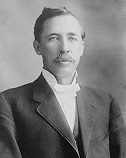
On Jan. 9, 1911 Marion, Ky.-born banker-atty. Lee Cruce (1863-1933) becomes Okla. gov. #2 (until Jan. 11, 1915), going on to establish the Okla. Dept. of Highways and the Okla. State Capitol while enforcing prohibition of alcohol and gambling, using the state militia to stop horceracing, fighting to abolish capital punishment and commuting 22 death sentences and allowing only one execution, and vetoing a bill to reapportion the state into eight congressional districts to maximize Dem. voting strength, which backfires, causing him to escape impeachment by the Okla. House of Reps by one vote; too bad, he doesn't interfere with lynchings of non-whites, writing to the NAACP to protest the appointment of a black to supervise Indian schools in Okla., with the soundbyte: "If your organization would interest itself to the extent of seeing that such outrages as this are not perpetrated against our people, there would be fewer lynchings in the South than at this time."

In May 1911 Ernest Whitworth "E.W." Marland (1874-1941), who became an oil millionaire in Penn. in 1907 then lost it in the Panic of 1907 strikes oil in his property in Okla., giving him a new fortune of $85M by 1920, when he founds Marland Oil Co., which eventually controls 10% of world oil production; in 1935-9 he serves as Dem. gov. #10 of Okla., backing FDR with his own Little Deal while busting the image of Okla. cowboys by engaging in English fox hunting.




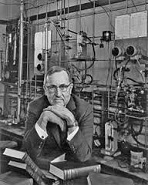
On Aug. 4, 1914 - Nov. 11, 1918 the horrific World War I causes 15M deaths and 39M military casualties. and destroys the Old Order of white formerly Christian Europe. On Feb. 26-28, 1915 the Germans first use a Flamethrower (Flame Projector) in the village of Douaumont, France near Verdun, becoming the first of 653 flamethrower attacks in the war. On Apr. 1, 1915 French aviator Roland Garros (1888-1918) becomes the first pilot to shoot down an aircraft using a deflector gear, which allows shooting through the propeller; after more Vs against German aircraft on Apr. 15 and Apr. 18, he is shot down and the Germans capture his plane, after which Dutch designer Anthony (Anton Herman Gerard) Fokker (1890-1939) clones then improves the deflector gear into the synchronization (interrupter) gear, mounting them on the new Fokker E.I. in Aug., beginning the Fokker Scourge (Scare) as they shoot down nearly every enemy aircraft they encounter and generate the first German aces, incl. Max Immelmann (1890-1916); next year the French counter with the Nieuport 11 Bebe (Bébé), in which the gun is mounted on the top wing clear of the prop, and the British with the Royal Aircraft Factory F.E.2b and Airco DH.2 (Feb. 1916), which mount the engine backwards with the prop in back, causing them to be called "pushers", ending the Fokker Scourge by spring 1917. In 1915 arsenic-based vomiting-sneeze gas Adamsite (DM) (diphenylaminechlorarsine) is synthesized by German chemist Heinrich Otto Wieland (1877-1957); in 1918 Am chemist Roger Adams (1889-1971) duplicates it, and both sides stockpile it, but it is allegedly never used on the battlefield. On Mar. 22, 1916 the British have their first success with their new Depth Charge off the SW coast of Ireland, destroying a German U-boat. Are you used to Hell yet, try this? On Sept. 15, 1916 Winston Churchill's pet project the Tank (Russian Water Closet) (Char-Schneider) is first used by the Brits in the Somme.
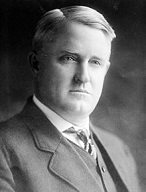
On Jan. 11, 1915 Robert Lee Williams (1868-1948), 1st Okla. chief justice (1907-14) becomes Dem. Okla. gov. #3 (until Jan. 13, 1919), going on to preside over Okla. govt. during WWI, repair the loss of exec power under gov. Lee Cruce by concentrating power, establish the Okla. State Board of Affairs to provide central purchasing services to state agencies, and oversee the state's response to U.S. Supreme Court rulings against Jim Crow laws.
On Jan. 1, 1917 Okla. gov. #3 (1915-19) Robert Lee Williams moves into the Okla. State Capitol before the state officially takes control on July 1; the state legislature holds its first meeting there next Mar. 18, which is not completed until 1919, sans dome, which is completed on Nov. 16, 2002.
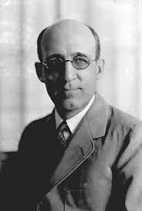
On June 13, 1917 Phillips Petroleum Co. (AKA Phillips 66) is founded in Bartlesville, Okla. by Frank Phillips (1873-1950) and his younger brother L.L. Phillips; on Dec. 23, 1969 they announce the first oil found in the North Sea at Ekofisk; on Aug. 30, 2002 they merge with Conoco to form ConocoPhillips, becoming the 3rd largest integrated energy co. on Earth, and 2nd largest refining co. in the U.S., with HQ in Houston, Tex.; in 2012 it splits back in two. In 1925 the Woolaroc (woods-lakes-rocks) wildlife preserve in NE Okla. in the Osage Hills 12 mi. SW of Bartlesville and 45 mi. N of Tulsa, named after the aircraft that won the Dole Air Race is established by it also houses a Western art and Am. Indian museum containing one of the largest collections of Colt brand firearms on Earth.
On Aug. 2-3, 1917 the Green Corn Rebellion sees the Pontotoc Rebels, 800-1,000 radicalized rural Oklahomans incl. Euro immigrants, Indians, and blacks pissed-off at the May 18, 1917 U.S. Selective Service Act start a cross-country march, claiming to live off off green corn, only to be betrayed by an informer and met by an armed posse, killing three, after which police move in and make several arrests, causing the Socialist Party of Am. to be discredited along with the Industrial Workers of the World (IWW).
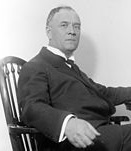
On Jan. 13, 1919 after defeating Repub. candidate Horace G. McKeever and Socialist candidate Patrick Nagle, Keokuk County, Iowa-born trial lawyer and U.S. district court judge (1908-10) James Brooks Ayers "J.B.A." Robertson (1871-1938) (grandmaster of the Independent Order of Odd Fellows in 1915-16) becomes Dem. Okla. gov. #4 (until Jan. 8, 1923), going on to back passage of the 18th and 19th Amendments to the U.S. Constitution, create a Board of State Regents and Okla. Commissioner of Pensions, establish cooperative farmer marketing agencies, and declare martial law during the 1919 Drumright Telephone Worker strike, E Okla. coal miner strike, and 1921 Tulsa Race Riot; his $50M bill for highway improvements is defeated by the voters, and he leaves office after a scandal involving his handling of pardons and paroles.
In the 1920s jazz-influenced Western Swing originates in small towns in Tex., Okla., and Calif., influenced by Dixieland jazz, featuring the steel guitar and an up-tempo dance beat.
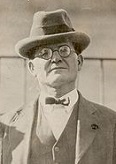
In 1920 oil fields in Osage County, Okla. in NE Okla. begin spectacular production, with members of the Osage Nation receiving lucrative royalties, becoming among the richest people in the U.S.; too bad, this attracts the sharks, causing the U.S. Congress to pass a law in 1921 requiring all Osage tribe members to have a court-appointed guardian until they can prove they are "competent", incl. minors with parents; too bad, many guardians become sharks too, and in 1921-5 the Osage Indian Murders in Osage County see 60+ wealthy Osage Indians murdered, with most never prosecuted, with the prominent exception of Greenville, Tex.-born "King of the Osage Hills" cattleman William King "Bill" Hale (1874-1962) 30+ people for their oil rights, and convicted in 1929 of only one; in 2000 the Osage Nation sues the U.S. Dept. of the Inferior, er, Interior for mismanagement of their assets and non-payment of royalties, and in 2011 the suit is settled for $380M plus promises to improve program mgt.
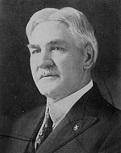
On Mar. 4, 1921 after a change in Okla. politics, Morgantown, Ky.-born oilman-atty. John William Herreld (1872-1950) becomes the first elected Repub. U.S. Senator in Okla. (until Mar. 4, 1927).

On May 31-June 1, 1921 the 16-hour Tulsa Race Riot breaks out in "Black Wall Street" (Greenwood neighborhood) of Tulsa, Okla., with a mob of 10K whites aided by police and the Nat. Guard burning down 35 city blocks (1,256 homes), causing $1.8M in property damage, leaving 10K homeless, and killing 200-300 (official totals 23 blacks, 16 whites); some whites drop dynamite from a plane onto the black ghetto?; after white Tulsa businessman ("Father of Route 66") Cyrus Stevens Avery (1871-1963) begins a push to build Route 66 (Nov. 11, 1926), and makes sure it goes through the town, and white country groups such as Bob Wills and the Texas Playboys set up shop, the town becomes a white haven, dubbed "America's most beautiful city" by Time mag. in the 1950s.
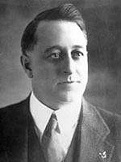
On Jan. 9, 1923 Greensboro, Ind. civil engineering contractor John Calloway "Jack" Walton (1881-1949) becomes Dem. Okla. gov. #5, going on to push progressive reforms through the legislature before making a boo-boo by declaring martial law in Okmulgee County and Tulsa County to fight the KKK, along with suspending habeus corpus, which is prohibited by the Okla. Constitution, becoming the first Okla. gov. to be removed from office, leaving on Nov. 19, going on to be elected to the Okla. Corporation Commission in 1932-9.
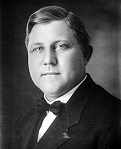
On Nov. 19, 1923 conservative Robinson, Kan.-born lt. gov. #3 (since Jan. 11, 1915) Martin Edwin Trapp (1877-1951) becomes Dem. Okla. gov. #6 (until Jan. 10, 1927) (first lt. gov.), reversing impeached gov. Jack Walton's progressive program, working with the legislature to abolish many state orgs. to reduce the size of govt., along with $10M in expenditures incl. Walton's new free textbook program and school aid, restoring the state's credit before enacting a 3-cent gasoline tax to finance the new Okla. Highway Commission, also the new Okla. Bureau of Criminal Investigation, Okla. Forestry Commission, Okla. Conservation Commission, and Okla. Fish and Game Commission, cracking down on the KKK with an anti-mask law and stricter enforcement of prohibition; too bad, the Okla. Constitution prohibits a gov. from succeeding himself even if you know what.
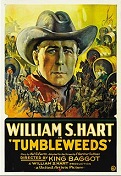
On Dec. 27, 1925 King Baggot's Tumbleweeds (United Artists) debuts, produced by and starring William S. Hart as drifter (tumbleweed) Don Carver, depicting the 1893 Okla. Cherokee Strip Land Rush, influencing the 1931 film "Cimarron"; co-stars Barbara Bedford as Carver's babe Molly Lassiter.

In May 1926 after playing some of the first cowboy music on U.S. radio, Ripley, Okla.-based Otto Gray (1884-1967) and His Oklahoma Cowboys ("Daddy of the Cowboy Bands") (formed in 1921 from real cowboys), incl. Billy McGinty, David "Pistol Pete" Cutrell, Johnny Bennett, Ernest Bevins, and Benjamin Francis "Whitey" Ford "the Duke of Paducah" release their first single Cow Boy's Dream (OKeh Records), followed by Pistol Pete's Midnight Special (May 1926), Bury Me on Not the Lone Prairie (Jan. 1928) (Gennett Records), Born About 4,000 Years Ago (Feb. 1931) (Melotone Records), and Mammy's Little Coal Black Rose (Feb. 1931) (Melotone Records). On June 6, 1931 they appear on the cover of Billboard, becoming the first country-western band on their cover.
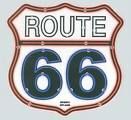
On Nov. 11, 1926 U.S. Route 66, a paved highway from Chicago, Ill. to Santa Monica, Calif. (2,448 mi.) through eight states (Ill., Mo., Kan., Okla., Tex., N.M., Ariz., Calif.) opens, later being called "the Mother Road" by John Steinbeck (1902-68), and also becoming known as "the Main Street of America" and "Will Rogers Highway" after it becomes a favorite for westward migration during the Dust Bowl years; after the U.S. Interstate Highway System makes it obsolete, it is decommissioned in 1985 after jazz pianist Bobby Troup sings about getting his kicks on it.

On Jan. 10, 1927 Evansville, Ind.-born Perry, Noble County, Okla. politician and U.S. Senator (since 1907) (Freemason) Henry Simpson Johnston (1867-1965), who served as the 1st pres. pro tempore of the Okla. Senate in 1907 and is backed by Protestant churchmen, Freemasons, and prohibitionists becomes Dem. Okla. gov. #7 (until Mar. 21, 1929), going on to establish a crippled children's hospital and increase school aid funds to $1.5M/year; too bad, his private secy. Mrs. O.O. Hammonds is caught holding too much power and making executive decisions, causing the legislature to try to impeach him in a special session, only to be told by the Okla. Supreme Court that they could only do it during a regular session or at the call of the gov., causing Johnston to order Okla. nat. guard troops to bar them from entering the Capitol, which doesn't stop them from trying it anyway, convening on Dec. 13, 1927 at the Huckins Hotel in Oklahoma City, impeaching him, then chickening out and dissolving; too bad, the 1928 U.S. nat. election is a landslide for Repub. Herbert Hoover over Roman Catholic Dem. candidate Alfred E. Smith, bringing out the anti-Catholic vote along with the anti-Prohibition vote, causing many Repubs. to come into state office on his coattails, and many of his followers to turn on him for campaigning for Smith, after which the legislature promptly impeaches him for incompetence after dropping 10 other charges, becoming the 2nd Okla. gov. to be impeached since Jack Walton in 1923.
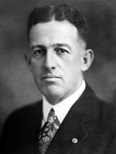
On Mar. 20, 1929 Arkadelphia, Ark.-born lt. gov. #4 (since Jan. 10, 1927) William Judson Holloway (1888-1970) becomes Dem. Okla. gov. #8 (until ?) (2nd lt. gov. to become gov.), going on to restore the progressive agenda, passing a statewide 45 mph speed limit, instituting an Okla. Temperance Day in public school on the Fri. nearest Jan. 16, instituting a runoff primary system, and calling a special session of the 12th Okla. Legislature on May 16, 1929 to fix the W boundary of Okla. and build toll bridges along the border; too bad, the Oct. 29, 1929 Stock Market Crash forces him into deficit spending.
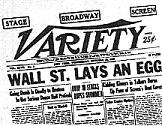



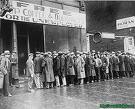

On Oct. 24, 1929 (Thurs.) Black Thursday is the beginning of the U.S. stock market crash, with 12,894,650 shares traded; the real fun starts next Tues. On Oct. 28 (Mon.) Black Monday sees 9M shares traded as prices continue to fall. Down on the corner, out in the street? Black Tuesday drops a bomb on the world? On Oct. 29 (Tues.) after a small temporary drop on Mar. 26, followed by a "golden summer" when the NYSE sets a record on Sept. 19 (Thur.), the huge WWI war debt finally catches up with the world as Black Tuesday descends upon the New York Stock Exchange, which crashes as 16M shares are traded, causing thousands of investors to be wiped out amid panic selling, leading the Fed to begin tightening credit, followed by a worldwide Great Depression; stock prices reach their lowest point on Nov. 13 (Wed.), falling from an avg. of 311.90 in Sept. to 164.43; industrial avgs. fall from 469.49 to 220.95 (a total of $30B in listed stock value wiped out in the NYSE); the Oct. 30 issue of Variety carries the title "Wall Street Lays An Egg"; part of the blame for the panic goes to the slowness of mechanical stock tickers; Jewish financier Bernard Mannes Baruch (1870-1965) brings Winston Churchill to personally view the NYSE on Oct. 24, fueling the speculations of conspiracy theorists, esp. after Baruch later becomes the person to coin the term "Cold War"?; gasoline, which costs 21.4 cents a gal. this year in the U.S. begins its own crash, not recovering to this level until 1947, after which it holds at 27 cents from 1949-52; Pres. Hoover attempts to take a leadership role with business and labor to smooth the nation over "rough spots", but fails to ask Congress for major legislation, allowing the latter to put the blame on him later, even though they proposed no new legislation either?
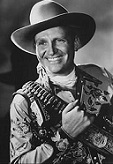
In 1929 "Oklahoma's yodeling cowboy" Orvon Grover "Gene" Autry (1907-98) (born in Tioga, Tex.) is discovered by Will Rogers, going on to wow America's hick chicks as "the Singing Cowboy", appearing in 93 films, always the mighty white, honest, brave, straight-shooting hero, with the theme song "Back in the Saddle Again", cranking out Christmas songs incl. "Rudolph the Red-Nosed Reindeer", "Frosty the Snowman", and "Here Comes Santa Claus".

In 1929 Kalamazoo, Mich.-born "Show Boat" novelist Edna Ferber (1885-1968) pub. the besteller Cimarron, about Wichita, Kan. newspaperman Yancy and his wife Sabra Cravat, who head to Okla. during the 1893 Okla. Land Rush and print the Okla. Wigwam until he deserts her; filmed in 1931 and 1960.
In 1930 the Dust Bowl begins forming as severe dust storms rock U.S. and Canadian prairies (ends 1936-40).




In 1930 after singing in 1928 on KVOO-AM in Tulsa, Okla. as "Oklahoma's Yodeling Cowboy", and signing with Columbia Records in 1929, Tioga, Tex.-born "Singing Cowboy" Orvon Grover "Gene" Autry (1907-98) appears on National Barn Dance (until 1934), hiring Summum, Ill.-born Lester Alvin "Smiley" Burnette (1911-67) (who can play 100 musical instruments) in Dec. 1933 as his sidekick. In 1931 he releases The Death of Mother Jones. In 1932 he releases his first hit That Silver-Haired Daddy of Mine with Jimmy Long (5M copies). In 1934 Autry and Burnette make their film debut in Mascot Pictures Corp.'s In Old Santa Fe. In 1935 The Phantom Empire debuts for the first of 12 episodes, starring Gene Autry as himself, and Burnette as comic relief Oscar, after which Republic Pictures Corp. hires them to make 44 films until 1940, with Burnette playing Frog Millhouse; in 1948 Autry replaces Burnette with Addison, Ala.-born Maxwell Emmett "Pat" Buttram (1915-94), who work together in 40+ films and 100+ TV episodes before Buttram is injured in 1951, after which Autry and Burnette team together for six final films for Columbia Pictures in 1952-3. In 1935 Autry releases Tumbling Tumbleweeds (1935), Mexicali Rose (1935), If You Want to be a Cowboy (1937) (from the film Git Along Little Dogies), South of the Border (1939), and his signature song Back in the Saddle Again (1939). On Jan. 7, 1940-Aug. 1, 1943 and Sept. 23, 1945-May 16, 1956 he hosts the radio show Gene Autry's Melody Ranch on CBS Radio, sponsored by Doublemint chewing gum. In 1941 he releases Blueberry Hill, followed by You Are My Sunshine (1941), Be Honest With Me (1941) (from the film Ridin' on a Rainbow), Don't Bite the Hand That's Feeding You (1942) (from the film Bells of Capistrano), I'm Thinking Tonight of My Blue Eyes (1944) (#3 country), Don't Fence Me In (1944) (#4 country), At Mail Call Today (1944) (#1 country), Don't Hang Around Me Anymore (1945) (#4 country), I Want to Be Sure (1945) (#4 country), Don't Live a Lie (1945) (#4 country), Silver Spurs (On the Golden Stairs) (1945) (#4 country), I Wish I Had Never Met Sunshine (1946) (#3 country), Wave to Me, My Lady (1946) (#4 country), You Only Want Me When You're Lonely (1946) (#7 country), Have I Told You Lately that I Love You? (1946) (#3 country), Someday (You'll Want Me to Want You) (1946) (#4 country), You're Not My Darlin' Anymore (1947) (#3 country), Here Comes Santa Claus (Right Down Santa Claus Lane) (1948) (#4 country) (#8 in the U.S.), Buttons and Bows (1948) (#6 country) (#17 in the U.S.), Ghost Riders in the Sky (1948), Rudolph the Red-Nosed Reindeer (w/Johnny Marks) (1949) (#1 country) (#1 in the U.S.), Peter Cottontail (1950) (#3 country) (#5 in the U.S.), Frosty the Snow Man (w/the Cass County Boys) (1950) (#4 country) (#7 in the U.S.), and Old Soldiers Never Die (They Just Fade Away) (1951) (#9 country). He goes on to release 640 records incl. 300+ songs written by himself, selling 100M copies, incl. the first certified gold record.
In 1931 the U.S. wheat harvest reaches 250M bushels after two decades of overplanting on the Am. prairie; by the end of the year 13M of 16M cultivated acres in Okla. are seriously eroded.

On Jan. 12, 1931 after winning the election by a record 100K votes with the campaign slogan "Down with the Three C's: Corporations, Carpetbaggers, and Coons", Toadsuck (Collinsville), Tex.-born Tishomingo, Okla. atty. William Henry Davis "Alfalfa Bill" Murray (1869-1956), who was the Chickasaw delegate to the Sequoyah Convention, a delegate to the 1906 Okla. Constitutional Convention, and the first speaker of the Okla. House of Reps, traveling to SE Bolivia in 1924-9 with a group of Okla. ranchers in a failed atempt to found a colony, gaining his nickname from speeches talking about his alfalfa field) becomes Dem. Okla. gov. #9 (until Jan. 15, 1935), going on to enjoy white supremacist support and back Jim Crow laws, setting a record for the number of times (47) he calls out the Nat. Guard and declares martial law while dealing with a $5M deficit left over by Gov. William J. Holloway, getting the legislature to appropriate $600K in emergency funds while becoming a nat. leader for Depression victims, convening a nat. council for relief in June 1931 in Memphis, Tenn., financing relief programs from his own salary, then establishing the Okla. Tax Commission to crack down on tax evaders; on Aug. 4, 1931 he calls out the Nat. Guard to shut down 3K oil wells to bolster prices, starting out supporting FDR's New Deal before turning against it, unsuccessfully seeking the 1932 Dem. U.S. pres. nomination and winning 20% in the Ore. primary.
On July 10, 1931 the Toll (Red River) Bridge War between Okla. and Tex. begins when the Red River Bridge Co. obtains an injunction preventing the Tex. Highway Commission from opening a new span NW of their toll bridge between Durant, Okla. and Denison, Tex. on U.S. Routes 69 and 75, claiming that they promised to buy the old bridge for $60K, pissing-off Tex. Gov. Ross S. Sterling, who orders the new bridge barricaded on the Tex. side, after which on July 16 Okla. gov. #9 (1931-5) Alfalfa Bill Murray orders it opened by the Okla. Nat. Guard, causing a Mexican standoff, with Murray patrolling the site carrying a revolver until Tex. lawyers determine that both sides are on Okla. territory, causing it to be opened on Sept. 7 (Labor Day); Adolf Hitler hears about the war, citing it as proof that the Union is coming apart?

On Oct. 20, 1931 Am. baseball hall-of-fame player (RF, CF, 1B) (New York Yankees #7) ("Oklahoma's Pride") ("the Mick") Mickey Charles Mantle (d. 1995) is born in Spavinaw, Okla.; he is named after Philadelphia Athletics catcher Gordon "Mickey" Cochrane by his zinc miner father; rejected from military service because of bad knees; his dad dies at age 39 from Hodgkin's Disease, and his grandfather and uncle from ditto before age 45, causing him to become a fast-living swinger?; he goes on to hit 536 MLB career homers, bat .300 or more 10x, and tie Jim Thorne in career walk-off homers (13).

In 1931 Norman, Okla.-born physicist-engineer Karl Guthe Jansky (1905-50) builds a radio telescope on a farm in N.J. out of aerials and old car wheels, calling it his merry-go-round, using it at first to investigate static in long-distance radio; in Aug. he discovers radio astronomy as the hisses reach a peak four min. earlier each day, matching the period of the Earth's rotation with respect to the stars, causing him to conclude that he is receiving cosmic radio waves.
In 1932 no rain falls on the Great Plains, turning it into a great Dust Bowl; in Jan. a black dust cloud 10K ft. high begins outside Amarillo, Tex., then blows into the city on Jan. 21 on the way to Okla., looking like "a range of mountains on the move" with "an edge like steel wool", causing the pop. to complain that if the sodbusters can't keep their dirt in place, someone should pave it over or park used cars on it; the storms become permanent for the next decade, which become known as the Dirty Thirties.
On May 12, 1933 after cotton prices collapse, the U.S. Agricultural Adjustment Act (AAA) is passed, designed to boost agricultural prices by buying livestock for slaughter and paying farmers not to plant, raising money for it via an exclusive corporate tax on processed farm products that requres farm product processors to be licensed, creating the Agricultural Adjustment Admin. as part of the USDA; too bad, the act causes landowners to evict tenant farmers to take the land out of production and receive subsidies, kicking off the Great Okie Migration to Calif; on Jan. 6, 1936 it is declared unconstitutional, causing the U.S. Soil Conservation and Domestic Allotment Act to be passed on Feb. 29, 1936; - don't fence me in?

On July 22, 1933 wealthy Tex. oil tycoon Charles Frederick Urschel (1890-1970) is kidnapped in Oklahoma City, Okla. by Memphis, Tenn.-born gangster Machine Gun Kelly (George Francis Barnes Jr.) (1895-1954), who takes him to a farmhouse in Paradise, Tex. and releases him on July 30 after a $200K ransom is paid; too bad, Urschel leaves clues and memorizes details that help the FBI track him down and capture him and his wife Kathryn Kelly on Sept. 26 in Memphis, Tenn., catching him without his Tommy gun, causing him to shout "Don't shoot, G-men!" and telling them, "I've been waiting all night for you" (coining the term "G-men"), after which he is the first person to be charged under the 1932 U.S. Little Lindbergh Law (Federal Kidnapping Act), receiving a life sentence after the first federal criminal trial in the U.S. in which cameras are allowed, the first prosecution in which defendants are transported by airplane, and the first major case solved by the FBI.
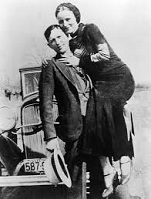
On May 23, 1934 after a 2-year crime spree of 100+ felonies in Tex., Mo., Ind., Minn., Ark., Okla., Colo., Miss., and Ill. that killed nine police officers and several civilians, flamboyant Texas outlaws Bonnie Elizabeth Parker (b. 1910) and Clyde Chestnut Barrow (b. 1909), AKA Bonnie and Clyde are shot to death in their stolen Ford Deluxe in a 6-man police ambush near Sailes, Biensville Parish 7 mi. from Gibsland, La. (future site of the Bonnie and Clyde Ambush Museum), ending their 2-year crime spree in a hail of 100+ bullets; Bonnie is shot 23x, Clyde 25x; license plates from Ill., Ind., Iowa, Kans., La., Mo., Ohio, and Tex. are found in the car; Bonnie smokes Camel cigarettes not cigars, but a gag photo is so heavily circulated that she can't beat the rap.
In 1934 the Great Drought begins in the U.S. (ends 1937), covering 150K sq. mi. (75%) of the Great Plains, incl. parts of Okla., Tex., Kans., Colo., and N.M., becoming the worst drought in 1K years; caused by the planting of wheat during WWI on former grazing land to make a quick profit?

On Jan. 15, 1935 self-made oil millionaire Ernest Whitworth "E.W." Marland (1874-1941) becomes Dem. gov. #10 of Okla. (until Jan. 9, 1939), going on to back FDR and institute the "Little New Deal" in Okla., which ends up creating jobs for 90K of 150K unemployed in 1.3K WPA projects.
In Mar. 1935 dust storms begin plaguing Kansas, and on Apr. 8 after the air in Washington D.C. turns copper from dust blowing in from the W end of the Okla. Panhandle, the U.S. Emergency Relief Appropriation Act is passed, appropriating $4B to be used at FDR's discretion, along with $880M in previously unspent appropriations; in Apr. Congress approves the Works Progress Admin. (WPA), which begins operating on May 6. On Apr. 14 (p.m.) Black Sunday, a terrific 200-mi.-wide dust storm begins in Cimarron County, Okla., crossing into Kansas, dropping the temp. 25 deg. in an hour, and permanently blinding many people; 4.7 tons of dust per acre are dumped on W Kan., denting cartops; the wind blows at 40 mph or greater for 100 straight hours, displacing 300M tons of topsoil from the prairies; later the southern plains are plagued by up to 14M grasshoppers per sq. mi. after natural predators are killed by the dust; in July 1940 Woody Guthrie releases his debut album Dust Bowl Ballads, becoming one of the first concept albums, featuring Great Dust Storm Disaster; "On the 14th day of April 1935,/ There struck the worst of dust storms that ever filled the sky./ You could see that dust storm comin', the cloud looked deathlike black,/ And through our mighty nation, it left a dreadful track./ From Oklahoma City to the Arizona line,/ Dakota and Nebraska to the lazy Rio Grande,/ It fell across our city like a curtain of black rolled down,/ We thought it was our judgment, we thought it was our doom./ The radio reported, we listened with alarm the wild and windy actions of this great mysterious storm."


On Aug. 15, 1935 after leaving Seattle, Wash. in early Aug. in a new homemade seaplane, famed Van Zandt County, Tex.-born aviator Wiley Hardeman Post (b. 1898) and Oologah, Okla.-born part-Cherokee homespun humorist journalist William Penn Adair "Will" Rogers (b. 1879) leave Fairbanks, Alaska en route to Point Barrow, Alaska, then become lost in bad weather a few mi. away from their destination, causing them to land to ask for directions, and as they try to take off the engine fails and they plunge into a lagoon, killing both instantly; Rogers leaves the soundbyte: "When I die, my epitaph, or whatever you call those signs on gravestones, is going to read: 'I joked about every prominent man of my time, but I never met a man I dident [sic] like.' I am so proud of that, I can hardly wait to die so it can be carved."
In 1936 as 7K Okies arrive each mo. in Calif., the Los Angeles Police Dept. sends 136 deputies to the state line to turn them back if they are penniless, causing Ariz. and neighboring states to complain of "dumping hoboes" on them, causing the police to retreat.
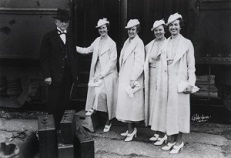
On May 31, 1937 Keys Quadruplets Mary, Mona, Roberta, and Leota (born June 4, 1915 in Hollis, Okla.) become the first quads to graduate from college, Baylor U.
On June 7, 1937 after one of the worst droughts in U.S. history, N.D. Repub. gov. Walter Welford proclaims a day of prayer for rain; too bad, it doesn't work, although Devil's Lake, N.D. records 0.16 in. of rain, and Welford asks FDR for $1M in aid; in early July a heat wave in the Am. West peaks with 119F on July 7 in N.D., causing a grasshopper invasion that threatens to starve the cattle, causing the federal govt. to send $5M to buy 1M head of cattle for the needy, and on July 17 proposes resettling 30% of farm families, and on Aug. 25 FDR takes a train to survey the situation, which becomes known as the Dustbowl Special; meanwhile a faked photo in the New York Times on Aug. 9 titled "Cattle Invade a State Capitol", showing cows grazing in Bismarck, and other faked photos stink the FDR admin up.
On June 26, 1936 the U.S. Okla. Indian Welfare (Thomas-Rogers) Act is passed by Congress; the United Keetoowah Band is formed from various Cherokee subgroups, and is recognized by Congress in 1949.

On Jan. 9, 1939 Grant City, Mo.-born conservative Okla. state rep. (1933-8) Leon Chase "Red" Phillips (1890-1958) becomes Dem. Okla. gov. #11 (until Jan. 11, 1943) (first state rep), going on to block the New Deal proposals of govs. William H. Murray and E.W. Marland, pushing for deep cuts but failing to balance the budget; after being charged with taking a bribe he is acquitted after two trials.

On Apr. 14, 1939 (74th anniv. of Pres. Lincoln's assassination) Salinas, Calif.-born John Ernst Steinbeck Jr. (1902-68) pub. The Grapes of Wrath (Pulitzer Prize), a bestselling realist novel based on articles written for the San Francisco News, causing a political storm comparable to Harriet Beecher Stowe's 1852 "Uncle Tom's Cabin"; Tom Joad gets out of priz, finds his Okla. farm gone with the wind, loads up his family in an old jalopy and heads for Calif., only to find prejudice against Okies and become radicalized; first to call Route 66 the "mother road".



On Sept. 1, 1939 - Sept. 2, 1945 the horrific $3.5T World War II resulted in 24M military and 49M civilian deaths, and featured the low point of the Jewish Holocaust (Shoah) by the German Nazis, I guess it was the Jews' fault for not ransoming themselves to go to Israel before they could round them up for the camps. The whole experience turned Jews from lovers into fighters, ramping up the Zionist movement with full world sympathy and support by new world superpower U.S., which had its own guilt trip because on Nov. 24, 1942 Budapest-born Am. Zionist leader Rabbi Stephen Samuel Wise (1874-1949) announced in a press conference in Washington, D.C. that he was authorized by the U.S. State Dept. to confirm that the Nazis had murdered 2M Jews as part of a plan to exterminate all Jews in Europe; too bad, the nat. newspapers didn't consider it front page news, and the U.S. govt. did nada. After the war ended and Americans toured the concentration camps in horror, Polish-born Jewish scholar Raphael Lemkin (1900-59), who single-handedly led an unsuccessful campaign to get the League of Nations to give internat. protections against genocide starting in 1933 finally got what he wanted after his own people got it, namely the Dec. 9, 1948 U.N. Convention on the Prevention and Punishment of the Crime of Genocide (Gen. Assembly Resolution 260), which didn't come in force until Jan. 12, 1951, and which the U.S. still didn't ratify until 1988.

On Jan. 24, 1940 John Ford's B&W The Grapes of Wrath (20th Cent. Fox) debuts, written by Nunnally Johnson based on the 1939 John Steinbeck novel, starring Henry Fonda as Tom Joad, Jane Darwell as Ma Joad, Russell Simpson as Pa Joad, Charley Grapewin as Grandpa Joad, John Carradine as Jim Casy, Dorris Bowdon as Rosasharn et al. as the Okie Joad family migrating to Calif. to get away from the Dust Bowl, only to be treated like merde and go Socialist; it ends with Tom Joad (Fonda) uttering the soundbyte: "I'll be all around in the dark. I'll be everywhere. Wherever you can look, wherever there's a fight, so hungry people can eat, I'll be there. Wherever there's a cop beatin' up a guy, I'll be there. I'll be in the way guys yell when they're mad. I'll be in the way kids laugh when they're hungry and they know supper's ready, and when people are eatin' the stuff they raise and livin' in the houses they build, I'll be there, too", after which Ma Joad (Jane Darwell) utters the soundbyte: "Can't lick us. Can't wipe us out. We'll go on forever 'cause we're the people"; does $2.5M box office on an $800K budget; watch trailer.
In 1941 after being proposed by Okla. gov. #11 (1939-43) Red Phillips, Okla. passes a constitutional amendment requiring a balanced budget.
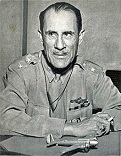
In 1941 Tinker Air Force Base (originally Midwest Air Depot until Jan. 13, 1948) in Oklahoma City, Okla. is established, named after Maj. Gen. Clarence Leonard Tinker (1887-1942), an Osage Indian from Pawhuska, Okla., the first Native Am. maj. gen. in U.S. Army history, who commanded the 7th Air Force in Hawaii in WWII before being killed in the June 1942 Battle of Midway when his plane crashed into the sea, becoming the first U.S. gen. killed in WWII.

On Jan. 11, 1943 Ada, Okla.-born Robert Samuel Kerr (1896-1963) becomes Dem. Okla. gov. #12 (until Jan. 13, 1947) (first native-born); on Jan. 3 he becomes U.S. Sen. from Okla. (until Jan. 1, 1963), going on to become chmn. of the Senate Committee on Aeronautical and Space Sciences, and promote the $1.2B McClellan-Kerr Arkansas River Navigation System (1969).
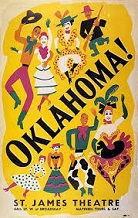
On Mar. 31, 1943 Richard Charles Rodgers (1902-79) and Oscar Greeley Clendenning Hammerstein II (1895-1960) debut their musical Oklahoma! (Away We Go) at the St. James Theater, based on the 1931 play "Green Grow the Hollies" by Lynn Riggs, becoming their first musical play; choreography by Agnes de Mille; farm girl Laurey Williams (Joan Roberts), cowboy Curly McLain (Alfred Drake), and farmhand Jud Fry (Howard Da Silva) of Claremore; wins a special Pulitzer Prize in 1944; record 2,212 consecutive perf. (first show over 500), ending the lean years of the Great Depression and launching a Golden Age of Broadway; incl. People Will Say We're in Love, Surrey With the Fringe on Top, Oh, What a Beautiful Mornin'; filmed in 1955.
On May 20, 1943 the McAlester Army Ammunition Plant (originally the McAlester Navy Depot) in McAlester, Okla. is established, going on to become the main manufacturing facility for U.S. military bombs; in 1988 McAlester becomes home of the Defense Ammunition Center (DAC) after it relocates from Savanna, Ill.
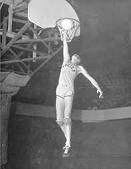

In Dec. 1944 six-foot-tenners Robert Albert "Bob" Kurland (1924-2013) of Okla. State U. (really 7'0") (first player to regularly slam dunk, who got defensive goaltending banned by the NCAA in 1945) and George Lawrence "Mr. Basketball" Mikan Jr. (1924-2005) (pr. MY-kun) of DePaul meet in the basketball "Battle of the Giants" in the 1945 NIT Semifinal; the final sees DePaul defeat Bowling Green by 71-54; the George Mikan Rule outlaws defensive goaltending; they meet again in a Red Cross benefit game, and Kurland's team defeats Mikan's team by 52-44 to gain an undisputed nat. championship; Mikan becomes basketball's first superstar; Kurland is named All-Am. three years in a row, and plays on the gold medal 1948 and 1952 U.S. Olympic teams.

On Jan. 15, 1945 after taking over from Jimmy Wakely at the Venice Pier Ballroom in Calif., Grand, Okla.-born part-Cherokee Western swing fiddler Donnell Clyde "Spade" Cooley (1910-69) and His Western Dance Gang release Shame on You (#1 in the U.S.), which becomes his signature song, going on to become known as "the King of Western Swing"; the first song pub. by Hill & Range Pub. Co. of Los Angeles, Calif., founded by Vienna, Austria-born Julian J. Aberbach (1909-2004) et al., which goes on to dominate country music (75% of the action in Nashville), contracting with Elvis Presley in 1955 to pub. all his songs, which keeps him from pub. his own material until the early 1970s. In 1945 Spade Cooley and His Orchestra release I've Taken All I'm Gonna Take from You (#4 country), followed by Detour (1946) (#2 country), You Can't Break My Heart (1946) (#3 country), and Crazy 'Cause I Love You (1947) (#4 country). In June 1948 Cooley begins hosting a radio show on KTLA-TV in Los Angeles, Calif, becoming the #1 draw on the West Coast. Too bad, in 1961 Cooley is convicted of the head-bashing stomach-stomping murder of his 2nd wife Ella Mae Evans, ending his career.

On Jan. 3, 1947 McAlester, Okla.-born Dem. Carl Bert Albert (1908-2000) becomes a U.S. from Okla. (until Jan. 3, 1977), going on to become House majority whip in 1955-62, House majority leaer in 1962-71, and U.S. Speaker of the House #46 on Jan. 21, 1971-Jan. 3, 1977, becoming known as "the Little Giant from Little Dixie", holding the highest political office of any Oklahoman (until ?); McAlester becomes known as "the Capital of Little Dixie" for its old-time Dem. politics.
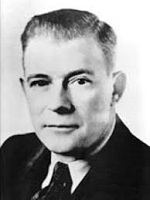
On Jan. 3, 1947 Lincoln County, Okla.-born Roy Joseph Turner (1894-1973), owner of the 10K-acre Turner Ranch in Sulphur, Okla. becomes Dem. Okla. gov. #13 (until Jan. 8, 1951), going on to establish the state turnpike system, the college board of regends, and oversee the end of segregation in the state's higher education system; in 1949 he releases the single My Memory Trail on the Beacon Music label.
On Apr. 9, 1947 the F5 Woodward Tornado begins in Tex. as an F2 in White Deer, sweeping 125 mi. to Woodward, Okla., killing 107 and causing $10.5M damage; 4-y.-o. Joan Gay Croft disappears; really a family of 8-9 tornadoes?

In 1947 Pontotoc County, Okla. Choctaw-Cherokee descent Baptist preacher Oral Robber, er, Granville Oral Roberts (1918-2009) has a magic moment with the Third Epistle of John, causing him to buy a Buick, see God, and turn Pentecostalist, going on radio, followed by TV in 1954, conducting 300+ faith healing crusades in the U.S. and six continents, laying hands on 2M people, claiming to heal them of all ailments and even to be able to raise the dead, raising lakes of cash via direct-mail campaigns under the banner of seed-faith, maxing out at $120M/year and employing 2.3K, going on to become "the Godfather of the Charismatic Movement", founding the Oral Roberts Evangelistic Assoc. in Tulsa, Okla., followed by Oral Roberts U. in 1963 in Tulsa, whose students must sign an honor code to not engage in premarital sex, drink, or smoke; on Mar. 17, 1968 he and his wife convert to the United Methodist Church. In Jan. 1987 two-bit phoney Am. Okla.-born backwoods so-called faith-healer Oral Roberts (1918-) (Oral Robber?) announces that back in Mar. of 1986 God had told him he had 12 mo. to raise $8M for medical scholarships for his Oral Roberts U. or he would die; on Mar. 23 greyhound racetrack owner Jerry Collins donates $1.3M, and with all the other donations Roberts lives - he has a double dose of Fokker in him?

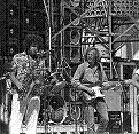
In 1947 Enville, Okla.-born rockabilly singer Cyrus Whitfield "Johnny" Bond (1915-78) and his Red River Valley Boys release their debut single Divorce Me C.O.D. (#4 country), followed by So Round, So Firm, So Fully Packed (1947) (#3 country), The Daughter of Jole Blon (1947) (#4 country), Oklahoma Waltz (1948) (#9 country), Love Song in 32 Bars (1950) (#8 country), Sick, Sober and Sorry (1951) (#7 country), Hot Rod Lincoln (by Charlie Ryan and W.S. Stevenson) (1960) (#26 in the U.S.), and 10 Little Bottles (1965) (#2 country) (#43 in the U.S.). In 1972 Commander Cody and His Lost Planet Airmen release Hot Rod Lincoln (#9 in the U.S.), which modifies Bond's version to rock it up.
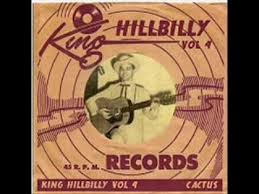
In 1947 Sallisaw, Okla.-born Western Swing musician Everett Ishmael "Billy" Hughes (1908-85) releases his 1-hit wonder Cocaine Blues (King Records) ("Now listen all you dopies, take my advice./ Don't ever use a needle more than twice/ Or you'll become an addict, and blow your lid./ Look at what it did to the Cocaine Kid."), going on to compose "Tennessee Saturday Night", which becomes a #1 country hit for Red Foley in 1949.

In 1948 Claremore, Okla.-born pop singer Patti Page (Clara Ann Fowler) (1927-2013) releases her first hit single Confess (#12 in the U.S.), becoming the first successful artist for Mercury Records. In 1948 she also releases Say Something Sweet (to Your Sweetheart) (w/Vic Damone) (#23 in the U.S.), followed by With My Eyes Wide Open, I'm Dreaming (#11 in the U.S.), followed by All My Love (Bolero) (1950) (#1 in the U.S.) (1M copies), Tennessee Waltz (by Redd Stewart and Pee Wee King) (1950) (#2 country) (#1 in the U.S.) (which begins a trend of crossing-over to country), Mockin' Bird Hill (1950) (#2 in the U.S.), Would I Love You (Love You, Love You) (1950) (#4 in the U.S.), I Don't Care if the Sun Don't Shine (1950) (#8 in the U.S.), I Went to Your Wedding (#1 in the U.S.), (How Much Is That) Doggie in the Window (#1 in the U.S.), Why Don't You Believe Me (#4 in the U.S.), Changing Partners (1953) (#3 in the U.S.), Cross Over the Bridge (1954) (#2 in the U.S.), Allegheny Moon (1956) (#2 in the U.S.), Mama from the Train (1956) (#11 in the U.S.), Old Cape Cod (1957) (#3 in the U.S.), Left Right Out of Your Heart (1958) (#9 in the U.S.), Mom and Dad's Waltz (1961) (#21 country) (#58 in the U.S.), Go On Home (1961) (#13 country) (#42 in the U.S.), Most People Get Married (1962) (#8 country) (#27 in the U.S.), Hush, Hush, Sweet Charlotte (1965) (#8 in the U.S.), Gentle On My Mind (by John Hartford) (#7 in the U.S.), and No Aces (1981) (#39 country). She goes on to release 40 albums and 110 charting singles incl. four #1s, selling 100M records.
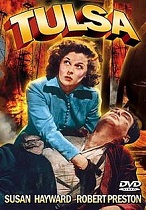
On Apr. 13, 1949 Stuart Heisler's Tulsa (Eagle-Lion Films) debuts, about the 1920s Tulsa, Okla. oil boom, starring Susan Hayward as Cherokee Lansing and Robert Preston as Brad Brady, who fight a giant oil well fire; does $2.34M box office on a $1.16M budget; watch trailer.
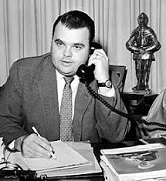
In 1950 super-conservative premillennialist Disciples of Christ minister (adopted orphan) Billy James Hargis (1925-2004) founds the Christian Crusade in Tulsa, Okla., hooking up with anti-Communist crusader Carl McIntire and U.S. Army Gen. Edwin Walker to mix religion and politics, attacking the U.S. govt. and popular entertainers until the Disciples of Christ withdraws his ordination in 1957, while his radio program booms, using direct mail marketing to bring in $1M/year from 250K donors by 1964, preaching the cosmic struggle of Christ vs. Satan (the U.S. vs. Communism), going on to advocate prayer and Bible reading in public schools and fight Roman Catholicism, segregation, the U.N., and Billy Graham, backing Repub. Ariz. Sen. Barry Goldwater in the 1964 U.S. pres. race and watching him go down in er, flames, causing the Old Christian Right he represented to begin a downward slide, being replaced after the loss of the Vietnam War by the New Christian Right which embraces Roman Catholicism; he goes on to pub. 100+ books, incl. The Real Extremists, the Far Left (Jan. 1, 1964), Distortion by Design: The Story of America's Liberal Press (Jan. 1, 1965), Why I Fight for a Christian America (Jan. 1, 1974), Slaughter of the Innocents, and the popular pamphlet (250K-1M copies) Is the School House the Proper Place to Teach Raw Sex?; too bad, the IRS revokes his tax exempt status in 1964, and in 1974 two college students (1 male, 1 female) accuse him of having sexual relations with them, but the Tulsa district atty. never files charges and the local newspapers cover it up after he resigns as pres. of his Am. Christian College (founded 1971); watch video; watch video; watch video; watch video; watch video.
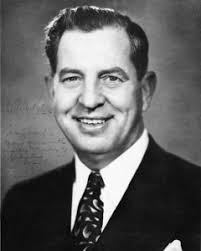
On Jan. 8, 1951 Emet, Chickasaw Nation (Johnston County), Okla.-born Johnston Murray (1902-74), son of gov. #9 William H. Murray (who swears him in) becomes Dem. Okla. gov. #14 (until Jan. 10, 1955), going on to unsuccessfully work to reduce state spending, running his wife Willie unsuccessfuly for gov. in 1954; his mother is one-eighth Chickasaw, making him the first Okla. gov. of Indian descent.
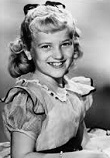
In 1953 Oklahoma City, Okla.-born Gayla Rienette Peevey (1943-) releases her hit song I Want a Hippopotamus for Christmas on Columbia Records, after which the Oklahoma City Zoo raises $3K to purchase baby hippo Matilda (1951-98).
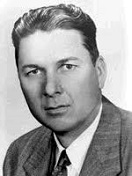
On Jan. 10, 1955 Kingston, Okla.-born Raymond Dancel Gary (1908-93) becomes Dem. Okla. gov. #15 (until Jan. 12, 1959) (first born in Okla.), immediately declaring his intention of making Okla. comply with the 1954 U.S. Supreme Court Brown v. Board of Education decision, ordering "whites only" and "colored only" signs removed from state capitol restrooms.



On Oct. 11, 1955 Fred Zinnemann's Oklahoma! debuts, based on the 1943 musical by Aaron Copland (1900-90) and Jerome Robbins (1918-98), becoming the film debut of Shirley Mae Jones (1934-) as Laurey; Gordon MacRae plays Curley, Rod Steiger plays Jud Fry, Eddie Albert plays Ali Hakim, Gene Nelson plays Will Parker, and Gloria Grahame plays Ado Annie; the first film to use the Todd-AO process, invented by Michael "Mike" Todd (Avrom Hirsch Goldbogen) (1909-58), the 3rd of Elizabeth Taylor's seven husbands; on July 8, 1958 the Oklahoma! Soundtrack (#1 in the U.S.) receives the first-ever gold album from the Recording Industry of Am., and on Apr. 1, 1992 it is certified 2x multi-platinum.
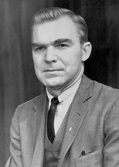
On Jan. 12, 1959 Muskogee, Okla.-born atty. James Howard Edmondson (1925-71) becomes Dem. Okla. gov. #16 (until Jan. 6, 1963), the youngest so far (until ?), winning by the largest majority so far (until ?), going on to push a reform platform incl. repeal of prohibition before resigning to fill the U.S. Senate seat of Robert Samuel Kerr (until Nov. 3, 1964).

In 1959 after gaining nat. exposure on Ozark Jubilee in 1955-7, Wellston, Okla.-born "Pretty Miss" Norma Jean Beasler (1938-) (known simply as Norma Jean when Red Foley makes it official in 1958) releases her first country single Chapel Bells (Columbia Records), which is a non-charter, followed by several more, causing Columbia Records to drop her. In 1961-7 after moving to Nashville, she becomes a member of The Porter Wagoner Show. In 1963 after Chet Atkins signs her with RCA Victor Records, she releases Let's Go All the Way (1963) (#11 country), followed by I'm A Walking Advertisement (For the Blues) (1964) (#32 country), and Put Your Arm Around Her (1964). In 1965 after joining the Grand Ole Opry, she releases Go Cat Go (1964) (#8 country) (#134 in the U.S.), followed by I Cried All the Way to the Bank (#21 country), followed by I Wouldn't Buy a Used Car from Him (1965) (#8 country), Put Your Arms Around Her (1965) (#25 country), Don't Let That Doorknob Hit You (1966) (#24 country), The Game of Triangles (w/Liz Anderson and Bobby Bare) (1966) (#5 country), and Heaven, Help the Working Girl (1967) (#18 country). In 1967 she is replaced on The Porter Wagoner Show by Dolly Parton. In 1968 she releases You Changed Everything About Me But My Name (1968) (#35 country), followed by Whiskey Six Years Old (1970) (#48 country), and The Kind of Needin' I Need (1971) (#42 country). In 1971 she leaves RCA Records, gives up alcoholism, and becomes a Christian. In 1982 she releases Let's Go All the Way (w/Claude Gray) (#68 country) (Decca Records). She goes on to release 20 studio albums and 37 singles.
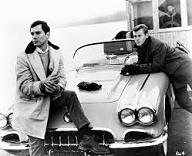

On Oct. 7, 1960 (Fri.) Stirling Silliphant's and Herbert Breiter Leonard's drama Route 66 debuts on CBS-TV for 116 episodes (until Mar. 20, 1964), starring Martin Sam Milner (1931-2015) as recent college grad Tod Stiles, who decides to travel U.S. Route 66 from Chicago, Ill. to Santa Monica, Calif. in his Chevy Corvette with friend Buz Murdock, played by George Maharis (1928-),who is replaced in season 3 by Vietnam vet Lincoln "Linc" Case, played by Glenn Corbett (1933-93); filming ends up covering 25 states plus Toronto, Canada, vs. only eight states on the real Route 66; the ultra-cool Route 66 Theme is by Nelson Riddle.

In 1960 Fort Worth, Tex.-born, Okla.-raised Roger Dean Miller Sr. (1936-92) releases his first hit single You Don't Want My Love (In the Summertime) (#14 country) (RCA Records), followed by Dang Me (1964) (#1 country) (#7 in the U.S.), Chug-a-Lug (1964) (#3 country) (#9 in the U.S.), Do-Wacka-Do (1965) (#15 country) (#31 in the U.S.), King of the Road (1965) (#1 country) (#4 in the U.S.) ("Trailer for sale or rent/ Rooms to let 50 cents/ No phone, no pool, no pets/ I ain't got no cigarettes/ Ah but two hours of pushin' broom/ Buys an 8 by 12 4-bit room/ I'm a man of means by no means/ King of the road"), Engine Engine #9 (1965) (#2 country) (#7 in the U.S.), Kansas City Star (1965) (#7 country) (#31 in the U.S.), England Swings (1965) (#3 country) (#8 in the U.S.),, Husbands and Wives (1966) (#5 country) (#26 in the U.S.). Walkin' in the Sunshine (1967) (#7 country) (#37 in the U.S.), Little Green Apples (1968) (#6 country) (#39 in the U.S.), Me and Bobby McGee (1969) (#12 country) (#122 in the U.S.), Where Have All the Average People Gone (1969) (#14 country), and Tomorrow Night in Baltimore (#11 country).

On Jan. 13, 1963 Tonkawa, Okla.-born Repub. Henry Louis Bellmon (1921-2009) becomes Okla. gov. #18 (first Repub.) (until Jan. 9, 1967), after which he becomes a U.S. Sen. on Jan. 3, 1969-Jan. 3, 1981, followed by Okla. gov. #23 on Jan. 12, 1987-Jan. 14, 1991.

In 1963 Duncan, Okla.-born folk-country singer-songwriter Hoyt Wayne Axton (1938-99) (son of "Heartbreak Hotel" composer Mae Axton) releases his debut single Greenback Dollar (later covered by the Kingston Trio), followed by his album Joy to the World (1971), which features Joy to the World, and The Pusher. In 1974 he follows with When the Morning Comes (w/Linda Ronstadt) (#10 country) (#54 in the U.S.), followed by Boney Fingers (1974) (#8 country). In 1975 he releases album #14 Southbound (A&M Records) (#27 country) (#188 in the U.S.), which features Southbound, No No Song, Roll Your Own, and Nashville. In 1979 he releases the singles Della and the Dealer (#17 country), and A Rusty Old Halo (1979) (#14 country). Meanwhile his songs become hits for others incl. "Joy to the World" (Three Dog Night), "The Pusher" (Steppenwolf), and "No-No Song" (Ringo Starr), and he becomes a popular actor, doing a Big Mac TV commercial for McDonald's in 1969, then appearing in "The Black Stallion" (1979) and "Gremlins" (1984), and doing a TV commercial for Pizza Hut in 1985. Too bad, he becomes a cocaine addict, and has a stroke in 1995 before dying of a heart attack on Oct. 26, 1999 30 mo. after his mother. In 1998 the album The A&M Years is released, covering his biggest hits from 1973-6; it features Flash of Fire, Geronimo's Cadillac, and When the Morning Comes.




In 1963 after spending the 1950s in and out of priz, then getting out of priz in 1960 and going straight, Oildale, Calif.-born Bakersfield sound pioneer Merle Ronald "Hag" Haggard (1937-2016) releases his first hit Sing A Sad Song by Wynn Stewart (#19 country). In 1965 he marries Buck Owens' Blanchard, Okla.-born ex-wife Bonnie Owens (nee Campbell) (1929-2006) (until 1978) after she is named 1965 female vocalist of the year by the Academy of Country Music, becoming his singing partner. His debut duet album with Bonnie Owens (Just Between the Two of Us) (Sept. 6, 1966) (#9 country) (Capitol Records) features Just Between the Two of Us (w/Bonnie Owens) (by Liz Anderson) (#28 country). His debut album Strangers (Sept. 6, 1965) (#9 country) (Capitol Records) features (All My Friends Are Gonna Be) Strangers (w/Bonnie Owens) (by Liz Anderson) (#10 country), causing him to name his backing group The Strangers. Album #2 Swinging Doors (Oct. 3, 1966) (#1 country) features Swinging Doors (#5 country), and The Bottle Let Me Down (#3 country). Album #3 I'm A Lonesome Fugitive (Mar. 4, 1967) (#3 country) (#165 in the U.S.) features I'm A Lonesome Fugitive (#1 country) Album #4 Branded Man (Aug. 28, 1967) features Branded Man (#1 country), and I Threw Away the Rose (#2 country). Album #5 Sing Me Back Home (Jan. 2, 1968) (#1 country) features Sing Me Back Home (#1 country). Album #6 The Legend of Bonnie & Clyde (Apr. 8, 1968) (#6 country) features The Legend of Bonnie Clyde (co-written by Bonnie Owens) (#1 country). Album #7 Mama Tried (Oct. 3, 1968) (#4 country) features Mama Tried (#1 country). Album #8 Pride in What I Am (Feb. 3, 1969) (#11 country) (#189 in the U.S.) features I Take a Lot of Pride in What I Am (#3 country. Album #9 Same Train, Different Time (1969) features covers of Jimmie Ridgers songs. Album #10 A Portrait of Merle Haggard (Sept. 2, 1969) (#3 country) (#99 in the U.S.) features Workin' Man Blues (#1 country), and Hungry Eyes (#1 country). Album #11 Okie from Muskogee (Dec. 29, 1969) (#1 country) (#46 in the U.S.) features Okie from Muskogee (#1 country), a big counter-hippie hit for rednecks; "We don't smoke marijuana in Muskogee,/ We don't take our trips on LSD,/ We don't burn our draft cards down on main street/ We like living right and being free/ We don't make a party out of lovin'/ We like holdin' hands and pitchin' woo/ We don't let our hair grow long and shaggy/ Like the hippies out in San Francisco do/ I'm proud to be an Okie from Muskogee/ A place where even squares can have a ball/ We still wave Old Glory down at the courthouse/ And white lightnin's still the biggest thrill of all/ Leather boots are still in style for manly footwear,/ Beads and Roman sandals won't be seen,/ Football's still the roughest thing on campus,/ And the kids here still respect the college dean." Introducing My Friends the Strangers (Apr. 6, 1970) (#34 country) features Street Singer (#9 country) (#124 in the U.S.). Album #12 The Fightin' Side of Me (1970) (#1 country) features The Fightin' Side of Me (#1 country) (#92 in the U.S.), and Medley of Impersonations. Album #13 A Tribute to the Best Damn Fiddle Player in the World (My Salute to Bob Wills) (1970) features six remaining members of The Texas Playboys. Album #14 Hag (Apr. 22, 1971) (#1 country) (#66 in the U.S.) features Jesus, Take a Hold (#3 country) (#107 in the U.S.), I Can't Be Myself (When I'm With You) (#3 country) (#106 in the U.S.), Soldier's Last Letter (#3 country) (#90 in the U.S.), and Sidewalks of Chicago. Album #15 Someday We'll Look Back (Aug. 9, 1971) (#4 country) (#108 in the U.S.) features Someday We'll Look Back (#2 country), and Carolyn (#1 country). Album #16 Let Me Tell You About a Song (June 1972) (#7 country) (#166 in the U.S.) features Grandma Harp (#1 country), and Daddy Frank (Guitar Man) (#1 country). Album #17 It's Not Love (But It's Not Bad) (Dec. 1972) (#1 country) features It's Not Love (But It's Not Bad) (#1 country). Album #18 Merle Haggard's Christmas Present (Nov. 1973) (#4 country) features If We Make It Through December (#1 country) (#28 in the U.S.), which becomes a recession anthem. Album #19 If We Make It Through December (Feb. 1974) (#4 country) (#190 in the U.S.) features you guessed it. Album #20 Merle Haggard Presents His 30th Album (Aug. 1974) (#1 country), which features Album #21 Keep Movin' On (Apr. 1975) (#1 country) (#129 in the U.S.) features Movin' On (from the TV series), and Kentucky Gambler (by Dolly Parton). Album #22 It's All in the Movies (Feb. 1976) (#1 country) features It's All in the Movies, and The Seeker (by Dolly Parton). Album #23 My Love Affair with Trains (July 1976) features My Love Affair with Trains (by Dolly Parton) (#7 country), and Here Comes the Freedom Train (by Stephen H. Lemberg). Album #24 The Roots of My Raising (Nov. 1976) (#8 country), which features The Roots of My Raising (#1 country), and Cherokee Maiden (#1 country). Album #25 Ramblin' Fever (May 1977) (MCA Records) (#5 country) features Ramblin' Fever. Album #26 A Working Man Can't Get Nowhere Today (Sept. 1977) (#28 country) (Capitol Records) features A Working Man Can't Get Nowhere Today, and Making Believe (by Jimmy Work). Album #27 My Farewell to Elvis (Oct. 1977) (#6 country) (#133 in the U.S.) (MCA Records) features From Graceland to the Promised Land (#4 country). Album #28 I'm Always on a Mountain When I Fall (June 1978) (#17 country) features I'm Always on a Mountain When I Fall (by Chuck Howard). In 1978 he and his Vienna, Mo.-born 2nd wife (1978-83) Leona Williams (Leona Belle Helton) (1943-) release The Bull and the Beaver (#8 country). Album #29 Serving 190 Proof (May 18, 1979) (#17 country) features Heaven Was A Drink of Wine (#4 country), I Must Have Done Something Bad (#4 country), My Own Kind of Hat (#4 country), and Red Bandana (#4 country). Album #30 The Way I Am (Apr. 1980) (#16 country) features The Way I Am (#2 country). Album #31 Back to the Barrooms (Oct. 10, 1980) (#8 country) features Misery and Gin (#10 country) (from the 1980 film Bronco Billy). Album #32 Songs for the Mama that Tried (Sept. 1981) (#46 country) (MCA Records) features When God Comes and Gathers His Jewels (by Hank Williams Sr.). Album #33 Big City (Epic Records) (#3 country) (#161 in the U.S.) (500K copies) features Big City (#1 country), My Favorite Memory (#1 country), Are the Good Times Really Over (I Wish a Buck Was Still Silver) (#2 country). Album #34 A Taste of Yesterday's Wine (with George Jones) (Aug. 1982) (#4 country) (#123 in the U.S.) features Yesterday's Wine (#1 country), and C.C. Waterback (#10 country). Album #35 Going Where the Lonely Go (Nov. 1982) (#3 country) features Going Where the Lonely Go (#1 country), and You Take Me for Granted (by Leona Williams) (#1 country). The duet album Pancho & Lefty (Jan. 1983) (#1 country) (#37 in the U.S.) with Willie Nelson is their breakthrough album; it features Pancho & Lefty (by Townes Van Zandt) (#1 country), and Reasons to Quit (#6 country). Album #38 That's the Way Love Goes (Aug. 1983) (#8 country) features That's the Way Love Goes (#1 country), Someday when Things Are Good (#1 country), and What Am I Gonna Do (With the Rest of My Life) (#55 country). Album #39 It's All in the Game (1984) (#1 country) features It's All in the Game. In 1984 he releases the single A Place to Fall Apart (w/Janie Fricke) (#1 country). In 1987 Haggard releases his 38th #1 hit. In 1994 the album Mama's Hungry Eyes: A Tribute to Merle Haggard is released. He goes on to release 76 studio albums and 96 singles incl. 38 #1s.

In Dec. 1964 after giving his seat to J.P. "the Big Bopper" Richardson on the Day the Music Died, former bass player for Buddy Holly, Littlefield, Tex.-born Waylon Arnold Jennings (1937-2002), known for adopting the Lubbock Sound of Buddy Holly and the Red Dirt sound of Stillwater, Okla. releases his debut album Waylon at JD's. In 1969 he marries country singer Jessi Colter. In 1971 he releases the album Cedartown, Georgia, which features Cedartown, Georgia (#14 country). In Feb. 1972 after going outlaw, he releases the album Good Hearted Woman (RCA Records), which features Good Hearted Woman (co-written by Willie Nelson), followed in 1972 by Ladies Love Outlaws (RCA Records) (#11 country), coining the term outlaw for country music; it features Under Your Spell Again (w/Jessi Colter) (#39 country). In July 1973 he releases the album Honky Tonk Heroes (#14 country), with almost all of the songs co-written by Billy Joe Shaver, injecting a rock & roll attitude into Nashvilly honky tonk music; it features You Ask Me To (#8 country), and We Had It All (#28 country). Album #22 Dreaming My Dreams (June 1975) (#1 country) features Dreaming My Dreams with You (by Allen Reynolds) (#10 country), and Are You Sure Hank Done It This Way (#1 country). On Jan. 12, 1976 he releases the album Wanted! The Outlaws with Willie Nelson, Jessi Colter, and Tompall Glaser, reaching #1 on the country charts and #10 on the pop charts, becoming the first platinum country music album, featuring the singles Suspicious Minds (#2) and Good Hearted Woman (#1). In Jan. 1978 he and Willie Nelson release the album Waylon & Willie (#1 country) (#12 in the U.S.), which features Mamas Don't Let Your Babies Grow Up to Be Cowboys (#1 country), Lookin' for a Feeling (#1 country), I Can Get Off on You (#1 country), The Wurlitzer Prize (I Don't Want to Get Over You) (#1 country), and If You Can Touch Her At All (#5 country). In Sept. 1978 he releases the album I've Always Been Crazy (#1 country) (#48 in the U.S.), which features I've Always Been Crazy.

In 1966 after his song "Alley Oop" becomes a hit for The Hollywood Argyles in 1957, his song "Timber I'm Falling" becomes a hit for Ferlin Husky in 1964, and his song "There Goes My Everything" becomes a hit for Jack Greene in 1966, Spiro, Okla.-born singer-songwriter Dallas Frazier (1939-) releases his first charting single Elvira (#72 in the U.S.), named after a street in East Nashville, Tenn.; in 1978 Rodney Crowell covers it, turning The Oak Ridge Boys onto it, who make a #1 country hit of it in 1981. His singing career then limps along until 1973, while his songs get covered by a raft of stars incl. George Jones, Connie Smith, Brenda Lee, Charley Pride, Merle Haggard, Elvis Presley, Diana Ross, Jerry Lee Lewis, and Engelbert Humperdinck.

On Jan. 9, 1967 Marietta, Ohio-born Repub. Dewey Follett Bartlett Sr. (1919-79) becomes Okla. gov. #19 (first Roman Catholic) (until Jan. 11, 1971), becoming the first Okla. gov. eligible to seek reelection, only to lose to Tulsa atty. David Hall in the closest gubernatorial election in Okla. history so far (338,338 to 336,157).


On Aug. 13, 1967 Arthur Penn's Bonnie and Clyde debuts, set in 1930s Okla. and written by David Newman and Robert Benton, starring producer Warren Beatty (Henry Warren Beaty) (1937-) (brother of Shirley MacLaine) and Dorothy Faye Dunaway (1941-) as bank robbers Clyde Barrow (1909-34) and Bonnie Parker (1910-34), making Dunaway a dun-deal run-away star while upclassing gangster movies from trashy to art house and making all movies more violent; Bonnie lovingly strokes Clyde's gun, breaking the 1934 Hollywood Production Code; studio head Jack Warner tries in vain to get production blocked because he hates it, after which he retires in 1969; NYT film critic (since 1940) Bosley Crowther (1905-81) trashes it, causing it to be pulled from circulation until Time and Newsweek pub. two rave reviews and it's released again and becomes a hit, after which he is replaced in 1968 by Stefan Kanfer, whose first article reverses Crowther's, launching the era of New Hollywood (Am. New Wave), with a new generation of young filmmakers coming to prominence, producing films incl. "The Graduate" and "Easy Rider", with a new gen. of younger more amoral film critics and film school-educated dirs. all into "Radical Chic", which makes the outlaws into the good guys; "They're young... they're in love... and they kill people"; #4 grossing film of 1967 ($50.7M U.S. and $70M worldwide box office on a $2.5M budget); watch trailer.
In 1967 the lead-zinc mining center of Picher, Okla. in NE Okla. (founded in 1913) is discovered to have massive lead contamination, causing it to be incl. in 1980 in the Tar Creek Superfund Site by the EPA; in 1996 a study finds that 34% of the children suffer from lead poisoning, with the EPA calling it the most toxic place in the U.S., after which the town is evacuated.

In 1967 the Seattle SuperSonics (Sonics) NBA team is founded, named after Boeing's SST Project (later cancelled), with Al Bianchi as coach #1, drafting Walt Hazzard, Bob Rule, and Al Tucker, going on to lose their first game 114-116, and finish the 1967-8 season with a 23-59 record; in 1968 they trade Hazzard for 6'1" St. Louis Hawks star Leonard Randolph "Lenny" Wilkens (1937-) (#19), who becomes player-coach in 1969-72; in June 1970 they join the ABA; in 1975 new coach Bill Russell leads them to their first playoffs; after the 2007-8 season they relocate to Oklahoma City, Okla. as the Oklahoma City Thunder.

In 1967 Tulsa, Okla.-born h.s. student S.E. (Susan Eloise) Hinton (1950-) pub. her first novel The Outsiders, a bestseller (14M copies), based on rival gangs at Will Rogers H.S. in Tulsa, Okla.; narrated by Ponyboy Curtis, about the war between the working class Greasers (incl. brothers Ponyboy, Sodapop, and Darrel "Darry" Curtis, Johnny Cade, Dallas "Dally" Winston, Keith "Two-Bit" Matthews) and the wealthy privileged Socs (Soshes) (Cherry Valance, Marcia, Bob Sheldon, Randy Anderson); she writes most it at age 16, and it becomes a junior high and senior high school library hit, revolutionizing young adult fiction with realistic portrayals; too bad, she then suffers a 3-year writer's block; "When I stepped out into the bright sunlight from the darkness of the movie house, I had only two things on my mind: Paul Newman and a ride home..." (first and last sentence); filmed in 1983. In 1971 she pub. That Was Then, This Is Now; Mark and Byron deal with street fighting and girls. In 1975 she pub. Rumble Fish; named after the Siamese fighting fish; filmed in 1983. In 1979 she pub. Tex; "Bambi by another character". In 1988 she pub. Taming the Star Runner.

On Aug. 3, 1968 Ted Post's Hang 'Em High (United Artists) debuts, starring Clint Eastwood (the first production of his new Malpaso Co., named after a creek near his home of Carmel, Calif.) as ex-lawman Jed Cooper, who is wrongly lynched in 1889 Okla. Territory, then becomes a U.S. marshal and goes after the nine lynchers led by Capt. Wilson (Ed Begley), incl. Stone (Alan Hale Jr.), Charlie Blackfoot (Ned Romero), and weasly Miller (the real killer) (Bruce Dern); Inger Stevens plays widow Rachel Warren, who helps him, and Pat Hingle plays Eastwood's new boss, hanging judge Adam Fenton (based on Hanging Judge Isaac Parker of Ft. Smith, Ark.); Dennis Hopper plays the Prophet; a scene between Stevens and Eastwood where he kisses her and she doesn't seem to be turned on, then explains that she was raped by white men has an eerie meaning in the light of the fact that she secretly goes for black er, guys and ends up committing suicide?; does $6.8M box office on a $1.6M budget; watch trailer.

In 1968 Lawton, Okla.-born Navarre Scott Momaday (1934-) (Kiowa father, Cherokee mother) pub. his first novel House Made of Dawn (Pulitzer Prize), about a young Native Am. unable to live in white or Indian society, making him the symbol for a new gen. of Native Am. writers incl. Louise Erdrich (1954-), Leslie Marmon Silko (1948-), and James Welch (1940-2003), who launch the Native Am. Renaissance.

On June 11, 1969 (Chinese Year of the Rooster) Henry Hathaway's True Grit (Paramount Pictures) debuts, written by Marguerite Roberts based on the 1968 Charles Portis novel and filmed in Ridgway, Colo., starring John Wayne as cranky alcoholic U.S. deputy marshal Reuben J. "Rooster" Cogburn, and Kim Darby as 14-y.-o. ingenue Mattie Ross of Dardanelle, Yell County, Ark., who hires him to find her daddy's killer Tom Chaney (Jeff Corey), telling him "They tell me you are a man with true grit"; after a trek joined by Texas Ranger La Boef (Glen Campbell) (after Elvis turned down the part because they wouldn't give him top billing), she finds, shoots and wounds him in Indian Territory (Okla.), is taken prisoner by the Pepper gang, led by Lucky Ned Pepper (Robert Duvall), and Cogburn takes them on single-handed in the movie's climax: "I call that bold talk for a one-eyed fat man" (Ned Pepper); "Fill your hand, you son of a bitch!" (Cogburn); spawns 1975 sequel "Rooster Cogburn"; refilmed in 2010 by the Coen Brothers.
In 1970 the state of Oklahoma is 89.1% white, beginning a downward slide to 82.1% in 1990, 76.2% in 2000, and 72.0% in 2010; two or more races rises from 4.5% in 2000 to 6.0% in 2010.
In 1970 the $50K biennial Neustadt Internat. Prize for Lit. is established by the U. of Okla., publisher of World Lit. Today, becoming known as the "American Nobel" after multiple awardees get awarded Nobels; the first U.S. winner is poet Elizabeth Bishop (1976).
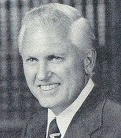
On Jan. 11, 1971 Oklahoma City, Okla.-born U. of Tulsa law prof. David Hall (1930-2016) becomes Okla. gov #20 (until Jan. 13, 1975), going on to expand state vocational training and sign the Okla. Income Tax Act; after leaving office he is convicted of bribery and extortion, becoming the first Okla. gov. convicted of crimes in office, going on to serve 19 mo. of a 36-mo. sentence.
On Feb. 20, 1971 (eve.) the 1971 Okla. Blizzard in NW Okla. brings a record 36 in. of snow (until ?), leaving 20 ft. snowdrifts; it also hits the Tex. Panhandle.


On June 5, 1971 the $1.2B McClellan-Kerr Arkansas River Navigation System opens, sponsored by U.S. Sens. Robert Samuel Kerr (1896-1963) (D-Okla.) (1949-63) and John Little McClellan (1896-1977) (D-Ark) (1943-77), connecting the Verdigris River in Okla., the Arkansas River, the Mississippi River, and the White River in Ark. incl. the Arkansas Post Canal, turning the Arkansas River into a navigable inland waterway system containing 17 locks and dams from the Tulsa Port of Catoosa to the Gulf of Mexico, bringing in $3B in commercial-industrial development to the Arkansas River basin by 1973.
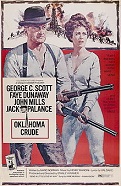
On July 3, 1973 Stanley Kramer's Oklahoma Crude (Columbia Pictures) debuts, set in the early 1900s, starring Faye Dunaway as landowner Lana Doyle, who fights to keep her shares of crude oil with her father Cleon Doyle (John Mills) and hired gun Noble Mason (George C. Scott); features the song "Send a Little Love My Way", sung by Anne Murray; does $2.5M box office; watch trailer.
On July 27-29, 1973 the 1973 Okla. State Penitentiary Riot ends with three inmates killed, 21 inmates and guards injured, 12 blgs. burned, and $30M damage, causing U.S. district judge Luther Bohannon to put the Okla. Dept. of Corrections under federal control.

On Nov. 13, 1974 plutonium-contaminated chem. technician and labor union activist Karen Gay Silkwood (b. 1946), who blew the whistle on the Kerr-McGee Cimarron Plutonium Plant near Crescent, Okla. (30 mi. N of Oklahoma City) is killed in a suspicious car crash; on May 18, 1979 her estate wins $10.5M compensation for the atomic contamination she suffered as a nuclear worker in 1974.

On Jan. 13, 1975 after swearing that "I have never been a homosexual or bisexual" to placate his opponent Anthony Points, Washington, D.C.-born conservative Dem. Yale U. grad (Skull & Bones) and Rhodes scholar David Lyle Boren (1941-) becomes Okla. gov. #21 (until Jan. 3, 1979), going on to advocate nationwide deregulation of natural gas prices, and elimination of inheritance tax for spouses; he then becomes a U.S. Sen. on Jan. 3, 1979-Nov. 15, 1994, going on to become a protege of Texas Sen. Lloyd Bentsen, Ga. Sen. Sam Nunn, and Ala. Sen. Howell Heflin, opposing the windfall profit tax on the domestic oil industry, become instrumental in the release of Nelson Mandela in South Africa, and be in the midst of enjoying breakfast with CIA dir. George Tenet when the 9/11 attacks happen.

On June 30, 1975 after being appointed by Pres. Ford, Tulsa, Okla.-born U.S. ambassador to India (since Feb. 28, 1973) Daniel Patrick Moynihan (1927-2003) becomes U.S. U.N. ambassador #12 (until Feb. 2, 1976), going on to become a vocal critic of U.N. Security Council Resolution 3379 declaring Zionism to be racism, making him a star, despite pissing-off Henry Kissinger, who accusing him of confusing foreign policy with a synagogue; he also shamelessly panders Pres. Ford's line that since Indonesia is a key ally against Communism, their 1975 invasion of East Timor is okay, successfully preventing U.N. Security Council action.
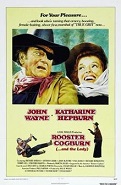
On Oct. 17, 1975 Stuart Millar's Rooster Cogburn (Universal Pictures) debuts, starring John Wayne as an aging 1-eyed U.S. marshal Reuben J. Cogburn in Fort Smith, Indian Territory (Okla.), who has been stripped of his badge by Judge Parker (John McIntire) because he's "gone to seed", and is given one last chance to track some outlaws incl. Hawk (Richard Jordan) and Breed (Anthony Zerbe) while hooking up with spinster Miss Eula Goodnight (Katharine Hepburn); does $17.6M box office on a $10M budget.

In Aug. 1977 McAlester, Okla.-born red-headed blue-eyed "Queen of Country" Reba Nell McEntire (1955-) releases her debut album Reba McEntire (Mercury Records), which is a flop; it features I Don't Wanna Be a One Night Stand. Album #2 Out of a Dream (Sept. 1979) features Last Night, Ev'ry Night (#28 country), Sweet Dreams (by Don Gibson) (#19 country), That Makes Two of Us (w/Jacky Ward) (#26 country), Runaway Heart (by Paul Harrison) (#36 country), and (I Still Long to Hold You) Now and Then (by Jerry Fuller) (#40 country). Album #3 Feel the Fire (Oct. 1980) features her first top-10 country hit (You Lift Me) (Up To Heaven) (#8 country), I Can See Forever in Your Eyes (#18 country), and I Don't Think Love Oughta Be That Way (#13 country). Album #4 Heart to Heart (Sept. 1981) (#42 country) features Today All Over Again (#5 country), and Only You (And You Alone) (by Buck Ram and Ande Rand) (#13 country). Album #5 Unlimited (June 1982) (#22 country) features Can't Even Get the Blues (#1 country), and You're the First Time I've Thought About Leaving (#1 country), and I'm Not That Lonely Yet (#3 country). Album #6 Behind the Scene (Sept. 1983) (#36 country), which features Why Do We Want (What We Know We Can't Have) (#7 country), and There Ain't No Future in This (#12 country). Album #7 Just a Little Love (Jan. 1984) (MCA Records) (#23 country) features Just a Little Love (#5 country), and He Broke Your Memory Last Night (#15 country). Album #8 My Kind of Country (Oct. 1, 1984) (#13 country) (500K copies) features How Blue (#1 country), and Somebody Should Leave (#1 country). Album #9 Have I Got a Deal for You (June 10, 1985) (#27 country) (500K copies) features Have I Got a Deal for You (#6 country), and Only in My Mind (#5 country). Album #10 Whoever's in New England (Feb. 1986) (#1 country) (1M copies) features Whoever's in New England (#1 country), and Little Rock (#1 country). Album #11 What Am I Gonna Do About You (Oct. 1986) (#1 country) (500K copies) features What Am I Gonna Do About You (#1 country), One Promise Too Late (#1 country), and Let the Music Lift You Up (#4 country). Album #12 The Last One to Know (Sept. 7, 1987) (#3 country) (#102 in the U.S.) (1M copies) features The Last One to Know (#1 country), and Love Will Find Its Way to You (#1 country). Album #13 Reba (Apr. 18, 1988) (#1 country) (#118 in the U.S.) (1M copies), her breakaway from a honky tonk to a Bakersfield sound features Sunday Kind of Love (#5 country), I Know How He Feels (#1 country), and New Fool at an Old Game (#1 country). Album #14 Sweet Sixteen (May 1, 1989) (#1 country) (#78 in the U.S.) (1M copies) features Cathy's Clown (#1 country), Walk On (#2 country), Til' Love Comes Again (#4 country), Little Girl (#7 country). Album #15 Rumor Has It (Aug. 17, 1990) (#2 country) (#39 in the U.S.) (3M copies) features You Lie (#1 country), Fallin' Out of Love (#2 country), Rumor Has It (#3 country), and Fancy (by Bobbie Gentry) (#8 country). On Mar. 23, 1991 (Sun.) an airplane crash kills most of the members of her touring band. Album #16 For My Broken Heart (Oct. 1, 1991) (#3 country) (#13 in the U.S.) (4M copies) features For My Broken Heart (#1 country), Is There Life Out There (#1 country), The Greatest Man I Never Knew (by Richard Leigh and Layng Martine Jr.) (#3 country), and The Night the Lights Went Out in Georgia (by Bobby Russell) (#12 country). Album #17 It's Your Call (Dec. 14, 1992) (#1 country) (#8 in the U.S.) (3M copies) features It's Your Call (#5 country) (#110 in the U.S.), The Heart Won't Lie (w/Vince Gill) (#1 country), Take It Back (#5 country). The compilation album Greatest Hits Volume Two (Sept. 28, 1993) (#1 country) (#5 in the U.S.) (5M copies) features Does He Love You (w/Linda Davis) (#1 country), and They Asked About You (#7 country). Album #18 Read My Mind (Apr. 26, 1994) (#2 country) (#2 in the U.S.) (3M copies) features The Heart Is a Lonely Hunter (#1 country), Till You Love Me (#2 country) (#78 in the U.S.), And Still (#2 country), Why Haven't I Heard from You (#5 country) (#101 in the U.S.), and She Thinks His Name Was John (#15 country) (#101 in the U.S.). Album #19 Starting Over (Oct. 3, 1995) (#1 country) (#5 in the U.S.) (1M copies) features Ring on Her Finger, Time on Her Hands (#9 country), and On My Own (w/Linda Davis, Martina McBride, and Trisha Yearwood) (by Carole Bayer Sager and Burt Bacharach) (#20 country). Album #20 What If It's You (Nov. 5, 1996) (#1 country) (#15 in the U.S.) (2M copies) features What If It's You (#15 country), How Was I to Know (#1 country), The Fear of Being Alone (#2 country), and I'd Rather Ride Around with You (#2 country). Album #21 If You See Him (June 2, 1998) (#2 country) (#8 in the U.S.) (1M copies) features If You See Him/If You See Her (w/Brooks & Dunn) (#1 country), Forever Love (#4 country), Wrong Night (#6 country), and One Honest Heart (#7 country). Album #22 So Good Together (Nov. 23, 1999) (#5 country) (#28 in the U.S.) (1M copies) features What Do You Say (#3 country) (#31 in the U.S.), I'll Be (#4 country) (#51 in the U.S.), and We're So Good Together (#20 country) (#109 in the U.S.). Her compilation album Greatest Hits Volume III: I'm a Survivor (Oct. 23, 2001) (#1 country) (#18 in the U.S.) (500K copies) features I'm a Survivor (#3 country) (#49 in the U.S.), and Sweet Music Man (#36 country). Album #23 Room to Breathe (Nov. 18, 2003) (#4 country) (#25 in the U.S.) (1M copies) features Somebody (#1 country) (#35 in the U.S.), He Gets That from Me (#7 country) (#59 in the U.S.), I'm Gonna Take That Mountain (#14 country) (#103 in the U.S.), and My Sister (#16 country) (#93 in the U.S.). Album #24 Reba: Duets (Sept. 18, 2007) (#1 country) (#1 in the U.S.) (1M copies) (last with MCA Records) features Because of You (w/Kelly Clarkson) (#2 country) (#50 in the U.S.), Every Other Weekend (w/Kenny Chesney) (#15 country) (#104 in the U.S.), and The Only Promise That Remains (w/Justin Timberlake). Album #25 Keep On Loving You (Aug. 18, 2009) (#1 country) (#1 in the U.S.) (Starstruck/Valory Records) features Strange (#1 country) (#76 in the U.S.), Consider Me Gone (#1 country) (#38 in the U.S.), and I Keep On Loving You (#7 country) (#78 in the U.S.). Album #26 All the Women I Am (Nov. 9, 2010) (#3 country) (#7 in the U.S.) features Turn On the Radio (#1 country) (#53 in the U.S.), and If I Were a Boy (#22 country) (#123 in the U.S.). She goes on to release 28 studio albums (incl. 14 #1s) and 93 singles incl. 25 #1s, and sell 80M records.

On Jan. 8, 1979 former gov. #17 (Jan. 6-14, 1963) and lt. gov. #8 and #10 (since Jan. 9, 1967) George Patterson Nigh (1927-) becomes Dem. Okla. gov. #22 (until Jan. 12, 1987), becoming the first to be reelected, and the first to win all 77 state counties, going on to establish the franchise tax in Okla., sign the Executive Branch Reform Act of 1986 on June 6, 1986, reorganizing the 250 agencies into function categories and the 500+ depts., agencies, boards et al. into a cabinet system, increase the number of minorities on state boards and commissions, and appoint the first two women to the Okla. Supreme Court.

On Feb. 4, 1981 after being nominated by Pres. Reagan, Duncan, Okla.-born staunch anti-Communist Repub. Jean Jordan Kirkpatrick (nee Jeane Duane Jordan) (1926-2006) becomes U.S. U.N. ambassador #16 (first woman) (until Apr. 1, 1985), becoming known for her Kirkpatrick Doctrine of U.S. support for any anti-Commie govt., incl. authoritarian regimes, causing Noam Chomsky to call her the "chief sadist-in-residence of the Reagan administration", uttering the soundbyte: "What takes place in the Security Council more closely resembles a mugging than either a political debate or an effort at problem-solving."
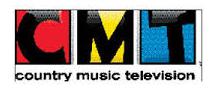


On Mar. 5, 1983 Viacom Inc.'s Country Music Television (CMT) in Nashville, Tenn. debuts on cable, growing to an audience of 91M U.S. households by 2013; the slogan is "Get country"; it is founded by Oklahoma City, Okla.-based media mogul Edward Lewis Gaylord (1919-2003), owner of The Oklahoman and Hee-Haw, who acquires the Grand Ole Opry and Opryland USA. On Mar. 7, 1983 The Nashville Network (TNN) debuts, founded by Edward Gaylord; in 2003 it becomes Spike TV, then Spike in 2006.

On Mar. 25, 1983 Francis Ford Coppola's The Outsiders (Zoetrope Studios) (Warner Bros.) debuts, based on the 1967 coming-of-age Socs-Greasers teen gang novel set in Tulsa, Okla. by teenie author S.E. Hinton, featuring a bevy of outsider future stars incl. Matt Dillon (Dallas "Dally" Winston), Rob Lowe (Sodapop Curtis), Diane Lane (Sherri "Cherry" Valance), Patrick Swayze (Darrel "Darry" Curtis), Tom Cruise (with bad teeth) (Steve Randle), C. Thomas Howell (Ponyboy Curtis), Ralph Maccio (Johnny Cade), and Emilio Estevez (Two-Bit Matthews); does $33.7M box office on a $10M budget.
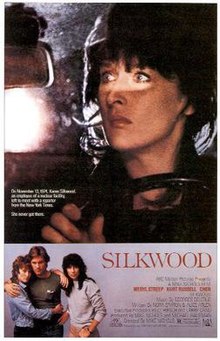
On Dec. 14, 1983 Mike Nichols' Silkwood (20th Cent. Fox) debuts, starring Meryl Streep as Kerr-McGee plutonium plant (Crescent, Okla.) whistleblower Karen Silkwood; does $35.6M box office on a $10M budget; watch trailer.
On Aug. 20, 1986 (7:00 a.m.) the Edmond Post Office Shooting in Edmond, Okla. sees disgruntled postal worker Patrick Sherrill shoot 20 co-workers and kill 14 before committing suicide, causing the phrase "going postal" to be coined.


On Apr. 12, 1989 Tulsa, Okla.-born Troyal Garth Brooks (1962-) releases his debut album Garth Brooks (#2 country) (#13 in the U.S.), produced by North Little Rock, Ark.-born "Dreaming My Dreams with You", "Five O'Clock World" songwriter Allen Reynolds (1938-), which sells 10M copies, launching his black-hatted super country career of 15 charted albums and 70 hit singles, with total sales of 68M albums, passing up the Beatles in 1991; it features Much Too Young (To Feel This Damn Old), If Tomorrow Never Comes (co-written by Kent Blazy) (his first country #1), Not Counting You, and The Dance (his personal favorite). Album #2 No Fences (Aug. 27, 1990) (#1 country) (#3 in the U.S.) (stays in the top-40 for 126 weeks) (17M copies) features Friends in Low Places (#1 country) (#36 in the U.K.), Unanswered Prayers (#1 country), Two of a Kind, Workin' on a Full House (#1 country), The Thunder Rolls (#1 country), and Wild Horses (#1 country) (#50 in the U.S.). Album #3 Ropin' the Wind (Sept. 2, 1991) (#1 country) (#1 in the U.S.0 (#41 in the U.K.) (17M copies) features Rodeo (#3 country), Shameless (#1 country), What She's Doing Now (#1 country), The River (#1 country), and Papa Loved Mama (#3 country). Album #4 The Chase (Sept. 22, 1992) (#1 country) (#1 in the U.S.) (#1 in the U.K.) (9M copies) features Somewhere Other than the Night (#1 country), That Summer (#1 country), Learning to Live Again (#2 country), and We Shall Be Free (#12 country). Album #5 In Pieces (Aug. 31, 1993) (#1 country) (#1 in the U.S.) (9M copies) features Ain't Going Down ('Til the Sun Comes Up) (#1 country) (#13 in the U.K.), American Honky-Tonk Bar Association (#1 country), Standing Outside the Fire (#3 country) (#28 in the U.K.), Callin' Baton Rouge (#2 country), One Night a Day (#7 country), and The Red Strokes (#49 country) (#13 in the U.K.). Album #6 Fresh Horses (Nov. 21, 1995) (#1 country) (#2 in the U.S.) (#22 in the U.K.) (7M copies) features She's Every Woman (#1 country), The Beaches of Cheyenne (#1 country), That Ol' Wind (#4 country), It's Midnight Cinderella (#5 country), and The Change (#19 country). Album #7 Sevens (Nov. 25, 1997) (#1 country) (#1 in the U.S.) (#34 in the U.K.) features In Another's Eyes (w/Trisha Yearwood). Album #8 Scarecrow (Nov. 13, 2001) (#1 country) (#1 in the U.S.) (5M copies) features Beer Run (B Double E Double Are You In?) (w/George Jones), Wrapped in You (#5 country), and Squeeze Me In (w/Trisha Yearwood). He then goes on a 10-year hiatus, and on Dec. 10, 2005 marries Trisha Yearwood.
In June 1990 radio stations in Kan., Okla. et al. stop playing records by lesbian singer "k.d. lang" after she begins a "Meat Stinks" campaign for 300K-member People for the Ethical Treatment of Animals (PETA) - she only means male meat?

On Sept. 7, 1990 Tulsa, Okla.-born honky tonk country singer Joe Logan Diffie (1958-) releases his debut album A Thousand Winding Roads (Epic Records) (#23 country), which features Home (#1 country), If You Want Me To (#2 country), If the Devil Danced (In Empty Pockets) (#1 country), and New Way (To Light Up an Old Flame) (#2 country). Album #2 Regular Joe (Jan. 14, 1992) (#22 country) (#132 in the U.S.) (500K copies) features Is It Cold in Here (#5 country), Ships That Don't Come In (#5 country), Next Thing Smokin' (#16 country), and Startin' Over Blues (#41 country). Album #3 Honky Tonk Attitude (Apr. 20, 1993) (#10 country) (#67 in the U.S.) (1M copies) features Honky Tonk Attitude (#5 country), Prop Me Up Beside the Jukebox (If I Die) (#3 country) (#122 in the U.S.), John Deere Green (#5 country) (#69 in the U.S.), and In My Own Backyard (#19 country). Album #4 Third Rock from the Sun (July 26, 1994) (#6 country) (#53 in the U.S.) (1M copies) features Third Rock from the Sun (#1 country) (#84 in the U.S.), Pickup Man (#1 country) (#60 in the U.S.), So Help Me Girl (#2 country) (#84 in the U.S.), I'm in Love with a Capital U (#21 country), and That Road Not Taken (#40 country). Album #5 Life's So Funny (Dec. 5, 1995) (#28 country) (#167 in the U.S.) (500K copies) features Bigger than the Beatles (#1 country), C-O-U-N-T-R-Y (#23 country), Whole Lotta Gone (#23 country), and Down in a Ditch. Album #6 Twice Upon a Time (Apr. 22, 1997) (#33 country) features Something Like This (#40 country), and The Promised Land (#61 country). His compilation album Greatest Hits (June 9, 1998) (#21 country) (#131 in the U.S.) features Poor Me (#43 country), and Texas Size Heartache (#4 country). Album #7 A Night to Remember (June 1, 1999) (#23 country) (#189 in the U.S.) features A Night to Remember (#6 country) (#38 in the U.S.), It's Always Somethin' (#5 country) (#57 in the U.S.), The Quttin' Kind (#21 country) (#90 in the U.S.), and Better Off Gone. Album #8 In Another World (Oct. 30, 2001) (#56 country) (Monument Records) features In Another World (#10 country) (#66 in the U.S.), and This Pretender (#49 country). Album #9 Tougher Than Nails (June 1, 2004) (#42 country) (Broken Bow Records) features Tougher Than Nails (#19 country) (#110 in the U.S.), and If I Could Only Bring You Back (#50 country). Album #10 Homecoming: The Bluegrass Album (Oct. 26, 2010) (Rounder Records) (#10 in the U.S.) features Somehow Tonight (by Earl Scruggs), Lonesome and Dry as a Bone (by Shawn Camp, Matt Lindsey, and Mel Tillis Jr.), and Tall Cornstalk (by Shawn Camp and Harley Allen). Album #11 All in the Same Boat (w/Sammy Kershaw and Aaron Tippin) (May 28, 2013) (#70 country) (Big Hit Records) features All in the Same Boat. He goes on to release nine studio albums and 35 singles incl. seven #1s.

On Jan. 14, 1991 Canute, Okla.-born Dem. David Lee Walters (1951-) (youngest exec officer at the U. of Okla. Health Sciences Center) becomes Okla. gov. #24 (until Jan. 9, 1995), going on to increase education funding by 30% and plead guilty to a misdemeanor election volation, causing him to not seek reelection.
On Apr. 26, 1991 the Kan.-Okla. Tornoado Outbreak of 1991 sees 55 tornadoes rake Kan. and Okla., killing 25 (20 in Kansas) and injuring hundreds.
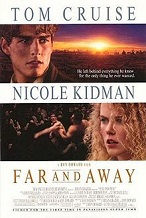
On May 22, 1992 Ron Howard's Far and Away (Imagine Entertainment) (Universal Pictures) debuts, starring Tom Cruise as Joseph Donnelly, a W Irish bare-knuckle boxer who flees to the U.S. after threatening his landlord, and Nicole Kidman as Shannon Christie, the landlord's daughter, who follows him to Boston and the 1893 Okla. Land Rush after sneaking a peak under his bowl; music by John Williams; also stars Colm Meaney; "What they needed was a country big enough for their dreams"; does $137.8M box office on a $60M budget; watch trailer; watch clip of Okla. Land Rush.

On Apr. 20, 1993 Clinton, Okla.-born country singer-songwriter Toby Keith (Toby Keith Covel) (1961-) releases his debut album Toby Keith (Mercury Records), which features Should've Been a Cowboy (#1 country), He Ain't Worth Missing (#5 country), A Little Less Talk and a Lot More Action (#2 country), and Wish I Didn't Know Now (#2 country). Album #2 Boomtown (Sept. 27, 1994) (#8 country) (#46 in the U.S.) (1M copies) features Who's That Man (#1 country), Upstairs Downtown (#10 country), You Ain't Much Fun (#2 country), and Big Ol' Truck (#15 country). Album #3 Blue Moon (Apr. 16, 1996) (#6 country) (#51 in the U.S.) (1M copies) features Does That Blue Moon Ever Shine on You? (#2 country), A Woman's Touch (#6 country), and Me Too (#1 country). Album #4 Dream Walkin' (June 24, 1997) (500K copies) (#8 country) (#107 in the U.S.) features Dream Walkin' (#5 country), We Were in Love (#2 country), and I'm So Happy I Can't Stop Crying (w/Sting) (#2 country). Album #5 How Do You Like Me?! (Nov. 2, 1999) (#9 country) (#56 in the U.S.) (1M copies) features How Do You Like Me Now? (#1 country) (#31 in the U.S.), Country Comes to Town (#4 country), When Love Fades (#44 country), and You Shouldn't Kiss Me Like This (#1 country). Album #6 Pull My Chain (Aug. 10, 2001) (#1 country) (#9 in the U.S.) (2M copies) features I'm Just Talkin' About Tonight (#1 country), I Wanna Talk About Me (#1 country), and My List (#1 country). Album #7 Unleashed (July 23, 2002) (#1 country) (#1 in the U.S.) (4M copies) features Courtesy of the Red, White and Blue (The Angry American) (#1 country), Who's Your Daddy? (#1 country), Beer for My Horses (w/Willie Nelson) (#1 country), and Rock You Baby (#13 country). Album #8 Shock'n Y'all (Nov. 4, 2003) (#1 country) (#1 in the U.S.) (4M copies) features I Love This Bar (#1 country) (causes him to launch the I Love This Bar and Grill chain, American Soldier (#1 country), and Whiskey Girl (#1 country). Album #9 Honkytonk University (May 17, 2005) (#1 country) (#2 in the U.S.) (2M copies) features Honkytonk U (#10 country), As Good As I Once Was (#1 country), and Big Blue Note (#5 country). Album #10 White Trash with Money (Apr. 11, 2006) (#2 country) (#2 in the U.S.) (1M copies), released on his own Show Dog Nashville label features Get Drunk and Be Somebody (#3 country), A Little Too Late (#2 country), and Crash Here Tonight (#15 country). Album #11 Big Dog Daddy (June 12, 2007) (#1 country) (#1 in the U.S.) features High Maintenance Woman (#3 country). Album #12 That Don't Make Me a Bad Guy (Oct. 28, 2008) (#1 country) (#5 in the U.S.) (500K copies) features She Never Cried in Front of Me (#1 country) (#42 in the U.S.), God Love Her (#1 country) (#36 in the U.S.), and Lost You Anyway (#10 country) (#69 in the U.S.). Album #13 American Ride (Oct. 6, 2009) (#1 country) (#3 in the U.S.) (500K copies) features American Ride (#1 country). Album #14 Bullets in the Gun (#1 country) (#1 in the U.S.) features Trailerhood (#19 country), and Somewhere Else (#12 country). Album #15 Clancy's Tavern (Oct. 25, 2011) (Universal Music) (#1 country) (#5 in the U.S.) (500K copies), named after his grandmother's bar in Fort Smith, Ark. features Made in America (#1 country) (#40 in the U.S.), Red Solo Cup (#9 country) (#15 in the U.S.), and Beers Ago (#6 country) (#52 in the U.S.). Album #16 Hope on the Rocks (Oct. 30, 2012) (#3 country) (#6 in the U.S.) (300K copies) features Hope on the Rocks (#18 country), and I Like Girls That Drink Beer (#29 country). Album #17 Drinks After Work (Oct. 29, 2013) (#3 country) (#7 in the U.S.) features Drinks After Work (#28 country) (#102 in the U.S.). He goes on to release 17 studio albums and 40+ charting singles incl. 19 #1s and 16 top-10s, and sell 40M albums worldwide.

On Jan. 9, 1995 former FBI agent Francis Anthony "Frank" Keating II (nee David Rowland Keating) (1944-) becomes Repub. Okla. gov. #25 (until Jan. 13, 2003), immediately having to deal with the Okla. City Bombing; in 1995 he gets the first welfare reform law in the U.S. passed, becoming a model for Pres. Clinton; in 1998 he becomes the first Okla. gov. in 50 years to get the state income tax cut; in Nov. 1998 he becomes the first Repub. gov. to win reelection, going on to raise $20M for a dome for the Okla. State Capitol.



Somebody gets smart in the U.S. homeland, or, Oh no, another right-winger listening to talk radio? On Apr. 19, 1995 (9:02 a.m. CDT) the Okla. City Bombing sees the Alfred P. Murrah Federal Bldg. in Oklahoma City, Okla. (opened Mar. 2, 1977) truck-bombed by army-trained white supremacists Timothy James McVeigh (1968-2001) and Terry Lynn Nichols (1955-), killing 168 incl. 19 children (some in diapers) and injuring 680+ in a day care center on the 2nd floor; a nurse dies during rescue efforts; the nation learns about the lethality of fuel oil and fertilizer; on Apr. 21 the feds arrest McVeigh, and his ass is grass and they got the lawnmower, fuel oil, fertilizer, and lighter?; in the days before McVeigh's arrest clears it all up, Americans assume that Muslim terrorists from the Middle East are to blame, resulting in nearly 250 incidents of harassment and violence; on Dec. 27, 2006 the House Internat. Relations Investigative Subcommittee releases its findings that there is no conclusive evidence of a foreign connection to the attack but that the FBI failed to fully investigate other suspects and executed McVeigh too soon without making enough effort to question him; the govt. covered-up connections with Muslims, incl. Ramzi Yousef (1967-) (1993 WTC bombing conspirator and nephew of 9/11 mastermind Khalid Sheik Mohammed), 1993 WTC bombing conspirator Abdul Hakim Ali Hashim Murad (1968-), and Hussain Al-Hussaini?; the govt. planted informant Andreas Strassmeir with McVeigh in advance, encouraging him to set off a bomb, which backfired bigtime, causing a coverup leading to the Clinton White House?
In 1995 the Justice Prisoner and Alien Transportation System (JPATS) AKA Con Air is established by the U.S. Marshals Service, with HQ in Kansas City, Mo., going on to transport 350K prisoners per year, with air fleet operations based at Will Rogers World Airport in Oklahoma City, Okla.
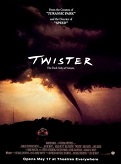
On May 17, 1996 Jan de Bont's Twister (Warner Bros.) debuts, starring Bill Paxton and Helen Hunt as Okla. Wizard of Oz tornado chasers Bill and Jo Harding, who are on the point of divorce until an extra-bad tornado brings them together in Aunt Meg's place in Wakita, Okla., incl. flying cows; #2 movie of 1996 ($242M U.S. and $494.4M worldwide box office on a $92M budget); watch trailer.
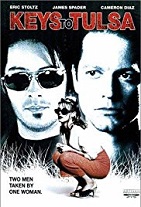
On Apr. 11, 1997 Leslie Greif's Keys to Tulsa (PolyGram) (ITC Entertainment) (Gramercy Pictures) debuts, based on the novel by Brian Fair Berkey, starring Eric Stoltz as privileged background loser Richter Boudreau, son of Tulsa celeb Cynthia (Mary Tyler Moore), who loses his girlfriend Trudy (Cameron Diaz) and is about to lose his job as a movie reviewer, selling drugs to make ends meet and ending up owing money to drug dealer Ronnie Stover (James Spader), who is married to his former lover, ex-debutante Vicky (Deborah Kara Unger), sister of alcoholic Keith (Michael Rooker) while hooking up with Chicago stripper Cherry (Joanna Going) and planning to blackmail wealthy Bedford Shaw (Marco Perella), son of businessman Harmon Shaw (James Coburn), getting Richter involved until Keith discovers that he has been sleeping with Vicky; last film produced by ITC; "Mom and I have one of those special relationships that transcend the usual bonds of family" (Richter); "Never trust anything that bleeds for five days and doesn't die" (Keith).
On Apr. 20, 1997 a 2.0 earthquake rocks Meers, Okla., located on the 15-mi.-long Meers Fault of the Wichita Mts. (oldest mountains in North Am.), the only fault that breaks the surface E of the Rocky Mts.
On May 2-8, 1999 the 1999 Okla. Tornado Outbreak sees 154 tornadoes touch down in Okla., Kan., Neb, Tex., Ark., and Canada, incl. 72 in Okla., culiminating with an F5 SE of Chickasha, Okla. that tears through Oklahoma City and its suburbs incl. unlucky Moore, Okla., killing 36, destroying 8K homes, and causing $1.5B damage; wind speeds set a record of 301 +/- 20 mph (484 +/- 32 km/h).
On Dec. 6, 1999 after "exploding" under the pressure to make good grades, 13-y.-o. student Seth Trickey in Ft. Gibson, Okla. opens fire at school with his father's 9mm semi-auto handgun, wounding five schoolmates, incl. a 13-y.-o. girl he shoots in the head.
On Jan. 27, 2001 (19:37 EST) the Okla. State U. Cowboys Basketball Team Plane Crash sees their Beechcraft Super King Air 200 crash in a field in a snowstorm en route home from Jefferson County Airport near Stasburg, Colo. 40 mi. E of Denver carrying two players and six broadcasters and coaching staff, killing 10 incl. the pilot and co-pilot, causing a memorial titled "Remember the Ten" to be erected in the Gallagher-Iba Arena in Stillwater, Okla.


On July 31, 2001 Ada, Okla.-born country singer Blake Tollison Shelton (1976-) releases his debut album Blake Shelton (#3 country) (#45 in the U.S.), featuring Austin (#1 country) (#18 in the U.S.). Album #2 The Dreamer (Feb. 4, 2003) (#2 country) (#8 in the U.S.) features The Baby (#1 country) (#28 in the U.S.), and Playboys of the Southwestern World (#24 country). Album #3 Blake Shelton's Barn & Grill (Oct. 26, 2004) (#3 country) (#20 in the U.S.) features Some Beach (#1 country) (#28 in the U.S.), and Nobody But Me (#4 country) (#60 in the U.S.). Album #4 Pure BS (May 1, 2007) (#2 country) (#8 in the U.S.) features Home (#1 country) (#41 in the U.S.), and Don't Make Me (#12 country) (#79 in the U.S.). Album #5 Startin' Fires (Nov. 18, 2008) (#7 country) (#34 in the U.S.) features She Wouldn't Be Gone (#1 country) (#43 in the U.S.), and I'll Just Hold On (#8 country) (#76 in the U.S.). On May 14, 2011 Shelton marries Miranda Lambert; they anounce their divorce on July 20, 2015, after which he begins dating No Doubt singer Gwen Stefani. On Aug. 18, 2014 he releases album #9 Bringing Back the Sunshine (#1 in the U.S., #1 country), which features Neon Light (#43 in the U.S.) (#1 country)), and Sangria (#38 in the U.S.) (#1 country).

On Jan. 13, 2003 Shawnee, Okla.-born Dem. atty. Charles Bradford "Brad" Henry (1963-) becomes Okla. gov. #26 (until Jan. 10, 2011) after being sworn-in by his cousin U.S. Appeals Court judge Robert Harlan Henry, becoming known for being pro-choice, pro-affirmative action in school, pro-death penalty, and anti-gun control, supporting tax cuts for the lower and middle classes, along with the War on Drugs to fight methamphetamine use; on Nov. 7, 2006 he is reelected with 66% of the vote.

On Oct. 5, 2004 Bray, Okla.-born country singer Katrina Ruth Elam (1983-) releases her debut album Katrina Elam (#42 country) (Universal South Records), which features No End in Sight (#29 country), and I Want a Cowboy (#59 country). Album #2 Turn Me Up (unreleased) features Love Is (#47 country), and Flat on the Floor (#52 country). Album #3 Pure Country 2: The Gift Soundtrack (Feb. 26, 2011) (#55 country) features Dream Big.

Here cums da judge? Oklahoma shows the power of Christianity to make public exposure of Dick Almighty a crime? In Jan. 2005 indecent exposure charges are filed against 58-y.-o. ex-judge Donald D. Thompson (1947-) of Oklahoma City for using a sexual device (a white-handled penis pump) to masturbate under his robe in court during trials, causing him to become known as the "Penis Pump Judge"; he retired in Aug. 2004 after 23 years on the bench after being threatened with removal; his trial in June-Aug. 2006 results in a 4-year sentence, despite claiming the pump was a gag gift and he never used it after court reporter Lisa Foster testifies she saw him expose himself in court at least 15x between 2001-3 - and kept her mouth shut?

On June 14, 2005 after winning Season 4 of American Idol on May 25, Muskogee, Okla.-born country singer Carrie Marie Underwood (1983-) releases her debut single Inside Your Heaven (#1 country) (#1 in the U.S.) (1M copies), becoming the first country music artist to debut at #1 on the Hot 100, and only single by a solo country artist in the 2000 decade to do it. On Nov. 15, 2005 she releases her debut album Some Hearts (#1 country) (#2 in the U.S.) (9M copies) (best-selling solo female debut album in country music history) features Jesus, Take the Wheel (#1 country) (#20 in the U.S.), Before He Cheats (#1 country) (#8 in the U.S.), Wasted (#1 country) (#37 in the U.S.), and Don't Forget to Remember Me (by Ashley Gorley, Kelley Lovelace, and Morgane Hayes) (#2 country) (#49 in the U.S.). Album #2 Carnival Ride (Oct. 23, 2007) (#1 country) (#1 in the U.S.) (3M copies) features So Small (#1 country) (#17 in the U.S.), All-American Girl (by Kelley Lovelace and Ashley Gorley) (#1 country) (#27 in the U.S.), Last Name (#1 country) (#19 in the U.S.), Just a Dream (#1 country) (#29 in the U.S.), and I Told You So (#2 country) (#9 in the U.S.). Album #3 Play On (Nov. 2, 2009) (#1 country) (#1 in the U.S.) (2M copies) features Cowboy Casanova (#1 country) (#11 in the U.S.), Temporary Home (#1 country) (#41 in the U.S.), Undo It (#1 country) (#23 in the U.S.), and Mama's Song (#2 country) (#56 in the U.S.). Album #4 Blown Away (May 1, 2012) (#1 country) (#1 in the U.S.) (1.4M copies) features Blown Away (#2 country) (#1 in the U.S.), Good Girl (co-written by Ashley Gorley and Chris DeStefano) (#1 country) (#1 in the U.S.), Two Black Cadillacs (#4 country) (#2 in the U.S.), and See You Again (#7 country) (#2 in the U.S.).
On Nov. 27, 2005 the Tex.-Okla. Wildfires of 2005-6 begin after a combo of high temps, drought, and high winds, with 22,564 wildfires burning 1,872,701 acres in the year as of Apr. 5, 2006.
On May 10, 2006 Okla. becomes the last U.S. state to make tattooing legal.
On Aug. 23, 2009 (Sun.) the body of pastor Carol Daniele (b. 1938) is found brutally murdered in Christ Holy Sanctified Church in Anadarko, Okla., riling people up.
On Dec. 22-28, 2009 the Category 5 2009 North Am. Christmas Blizzard hits the NW and SE U.S. incl. the Great Plains, and the Eastern Seaboard incl. Ontario, Canada, killing 21 and dropping 40 in. of snow; on Dec. 23-24 27 tornadoes are reported in the SE and C U.S.; on Dec. 24 the Christmas Eve 2009 Okla. Blizzard drops 10 in. in Oklahoma City and Wichita Falls, leaving 3 ft. snowdrifts.

On Nov. 2, 2010 (Tues.) Okla. becomes the first state to pass a law (State Question 755) banning judges from using Sharia or internat. law in their decisions, causing the Muslim Brotherhood front CAIR to file a lawsuit, after which on Nov. 8 Clinton-apointee U.S. district judge Vicki Miles-LaGrange (1953-) issues a temporary restraining order against the amendment, with the non-sequitur soundbyte "We are humbled by this opportunity to show our fellow Oklahomans that Muslims are their neighbors and that we are committed to upholding the U.S. Constitution and promoting the benefits of a pluralistic society"; on Nov. 29 she makes it permanent; Pres. Obama never speaks out on the constitutional issues involved, particularly that any attempt to enact Sharia is sedition?; on Nov. 5 Forbes mag. pub. its list of the most powerful people on Earth, demoting Obama from #1 to #2 after Chinese pres. Hu Jintao; Facebook mogul Mark Zuckerberg comes in #40.

On Jan. 10, 2011 Warrensburg, Mo.-born Repub. Mary Fallin (1954-) becomes Okla. gov. #27 (until ?), going on to push for increased use of lethal injection in executions, convene a task force to reform the state criminal justice system, unsuccessfully support the Ten Commandments monument on the grounds of the Okla. State Capitol, seek to expand sales tax and eliminate state income tax, order Nat. Guard facilities to deny spousal benefits to same-sex couples, refuse to comply with EPA regs to combat climate change, sign a law in Apr. 2014 prohibiting Okla. cities from establishing min. wage and sick leave reqts., along with another law in May 2015 prohibiting local govt. from enacting local bans on oil and gas drilling, sign a law in Apr. 15 expanding charter schools statewide, and sign 20 anti-abortion laws while vetoing a 2016 bill making it a felony to perform an abortion.
On Apr. 6, 2012 (1:00 a.m.) a shooting attack in Tulsa, Okla. kills three blacks and injures two; on Apr. 8 police arrest white men Jake England and Alvin Watts.
In 2012 the Ten Commandments Monument is erected in front of the Okla. State Capitol in Oklahoma City after a bill sponsored by state rep. Mike Ritze is passed, causing the ACLU to sue, resulting in the 7-2 Okla. Supreme Court decision Prescott v. Capitol Preservation Commission on July 27, 2015 that it is unconstitutional, causing it to be moved to private property in Oct. 2015, leading to calls for changing the Okla. Constitution; in 2014 a vandal destroys it, causing the New York-based Satanic Temple to cancel plans for their own Baphomet statue to be placed beside it on capitol grounds.
On May 20, 2013 (3:00 p.m.) the EF5 2013 Moore Tornado hits Moore, Okla. with peak winds of 210 mph (340 km/h), killing 24 and injuring 377; on Mar. 25, 2015 the 5th tornado in five years hits Moore.
On May 31, 2013 another tornado in Oklahoma City, Okla. kills five and injures 50, littering I-40 with wrecked cars.
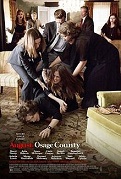
On Sept. 9, 2013 John Wells' August: Osage County (The Weinstein Co.) debuts, based on the 2007 Tracy Letts play stars Meryl Streep and Julia Roberts as narcotics-addicted Beverly Weston in hot Pawawhuska, Okla., whose alcoholic ex-poet hubby Beverly Weston (Sam Shepard) skips out and drowns, causing her to call for support from her dysfunctional family incl. sister Mattie Fae (Margo Martindale) and her hubby Charles Aiken (Chris Cooper), daughters Ivy (Julliane Nicholson) and Barbara Weston-Forham (Julia Roberts) and her hubby Bill Fordham (Ewan McGregor) and 14-y.-o. daughter Jean Fordham (Abigail Breslin), and Karen Weston (Juliette Lewis), only to see them fight and leave too; does $74.2M box office on a $37M budget.
On Apr. 27, 2014 tornadoes kill 16 in Ark. and one in Okla.
On May 22-26, 2015 the 2015 Texas-Okla. Flood and Tornado Outbreak sees a week of heavy rain incl. super rain on the nights of May 24-26 trigger record floods in Tex. and Okla., along with 75 EF3-max tornadoes incl. in Mexico, becoming the wettest mo. on record in Okla. (until ?), with Oklahoma City receiving 19.48 in.
On Sept. 3, 2016 (7:02 a.m.) a 5.6 earthquake rocks Norman, Okla. (same region as the Nov. 2011 earthquake), speading from Neb. to N Tex.

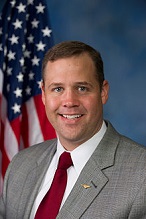
On Feb. 17, 2017 Okla. Repub. atty. gen. #17 (since Jan. 10, 2011) Edward Scott Pruitt (1968-) (activist against the EPA's activist agenda, as well as gay marriage, the Affordable Care Act, and abortion) becomes EPA admin. #14 (until ?). On Sept. 1 Pres. Trump nominates former Navy pilot U.S. Rep. (R-Okla.) (2013-) James Frederick "Jim" Bridenstine (1975-) as the new dir. of NASA, who vows to compete with China in space and wants a new Moon visit; on Dec. 11 Pres. Trump signs an executive order to NASA to prepare a return to the Moon for
On Apr. 16, 2018 new U.S. Supreme Court justice Neil Gorsuch hires Chickasaw Nation of Midwest City, Okla. member Tobi Merritt Edwards as a clerk, becoming the first Native Am. Supreme Court clerk in history.
On Apr. 26, 2018 the state of Okla. breaks the record for the longest tornado drought; the first one finally arrives on May 2.
On June 1, 2021 woke Pres. Biden visits Tulsa, Okla. to commemorate the 100th anniv. of the 1921 Tulsa Massacre, pledging federal money to reduce the racial wealth disparity gap regardless of laws prohibiting racial discrimination incl. $100B over 5 years for preferences for black-owned businesses, increasing their share from 10% to 50%.